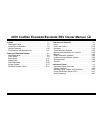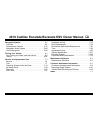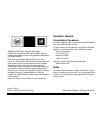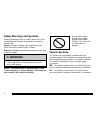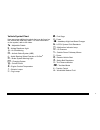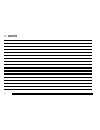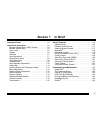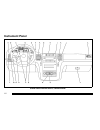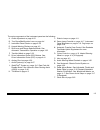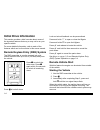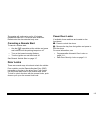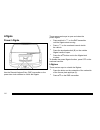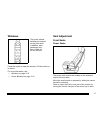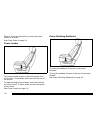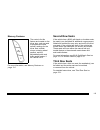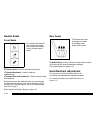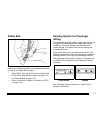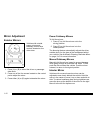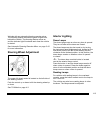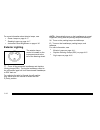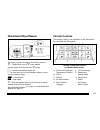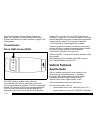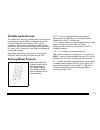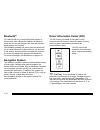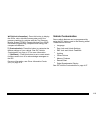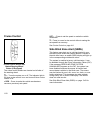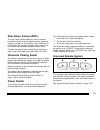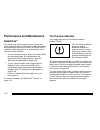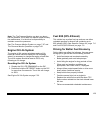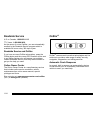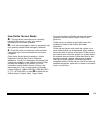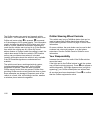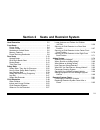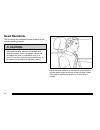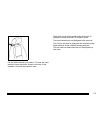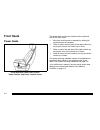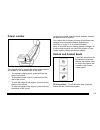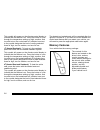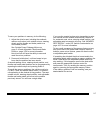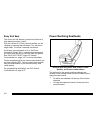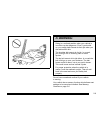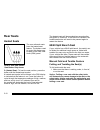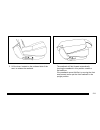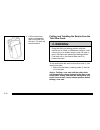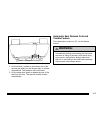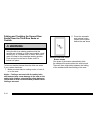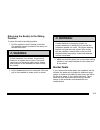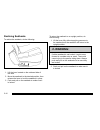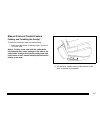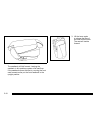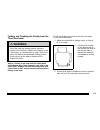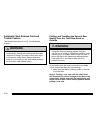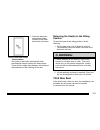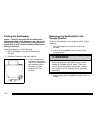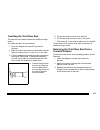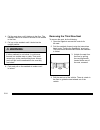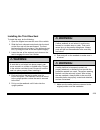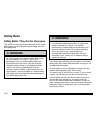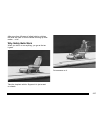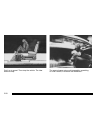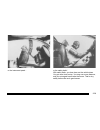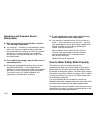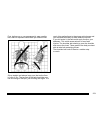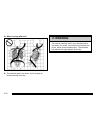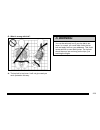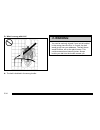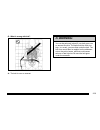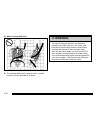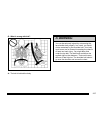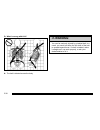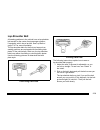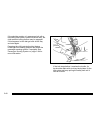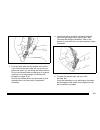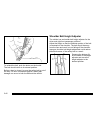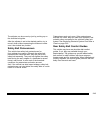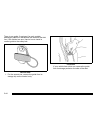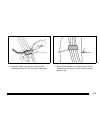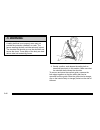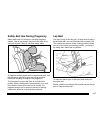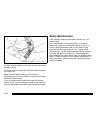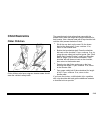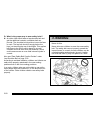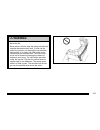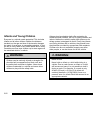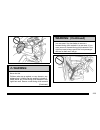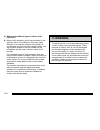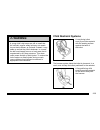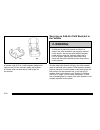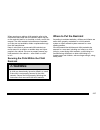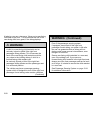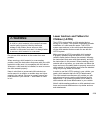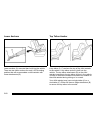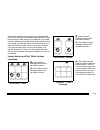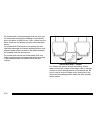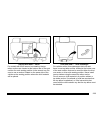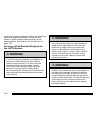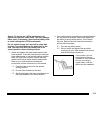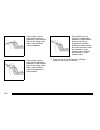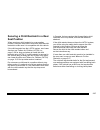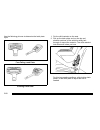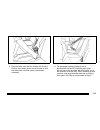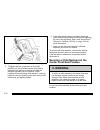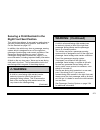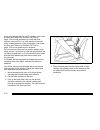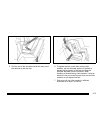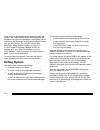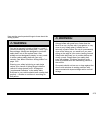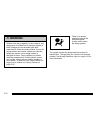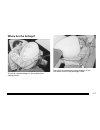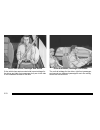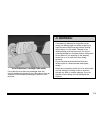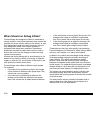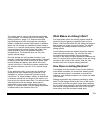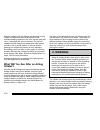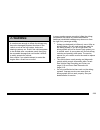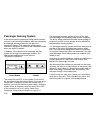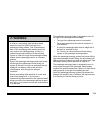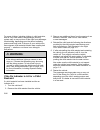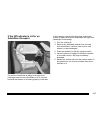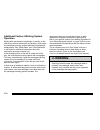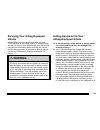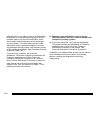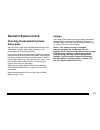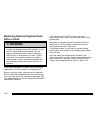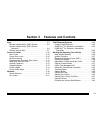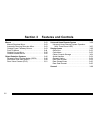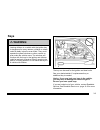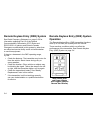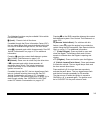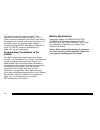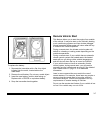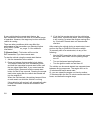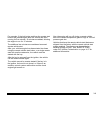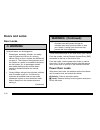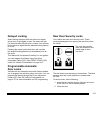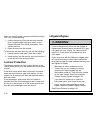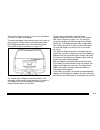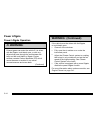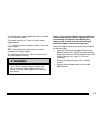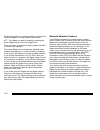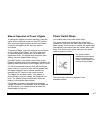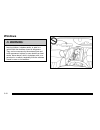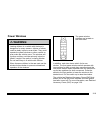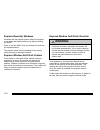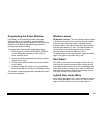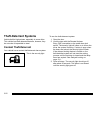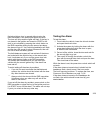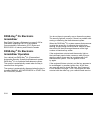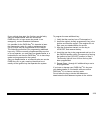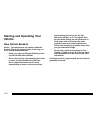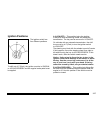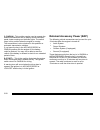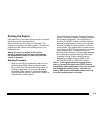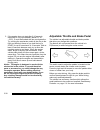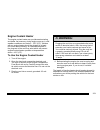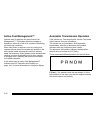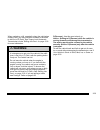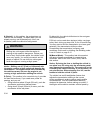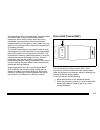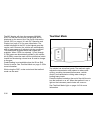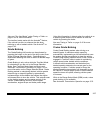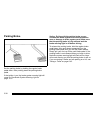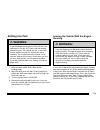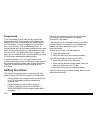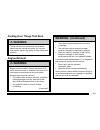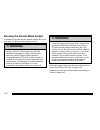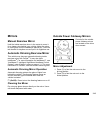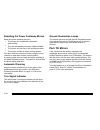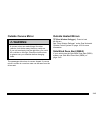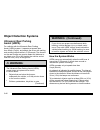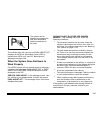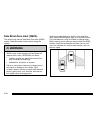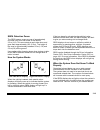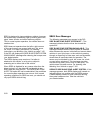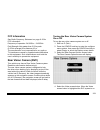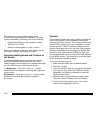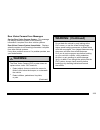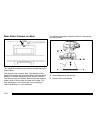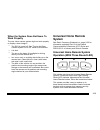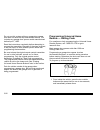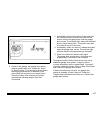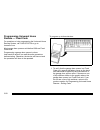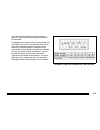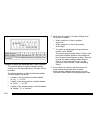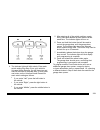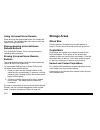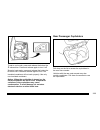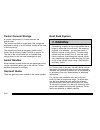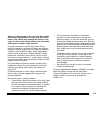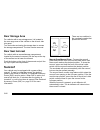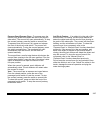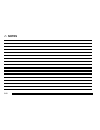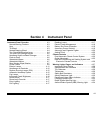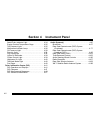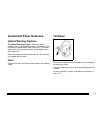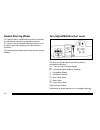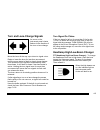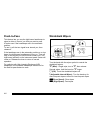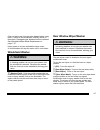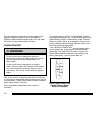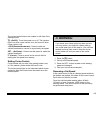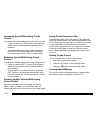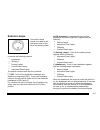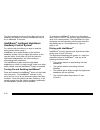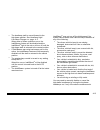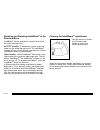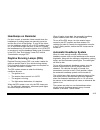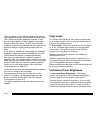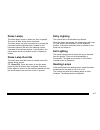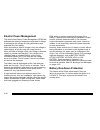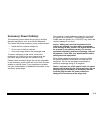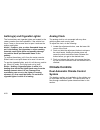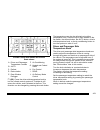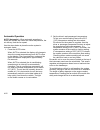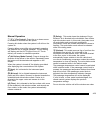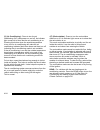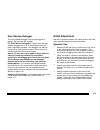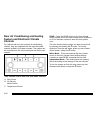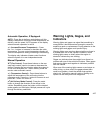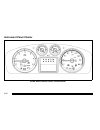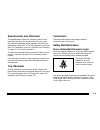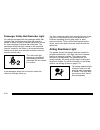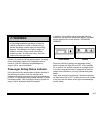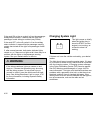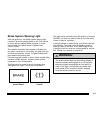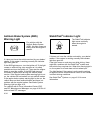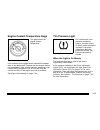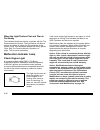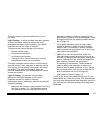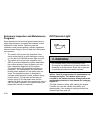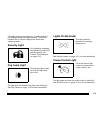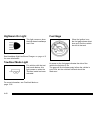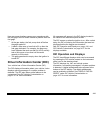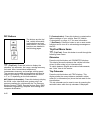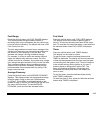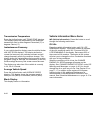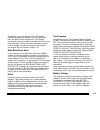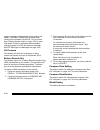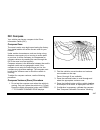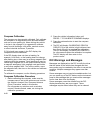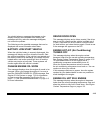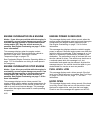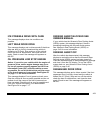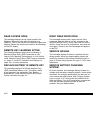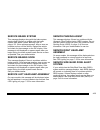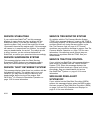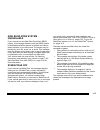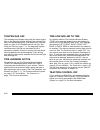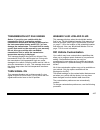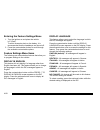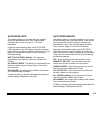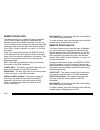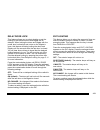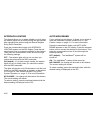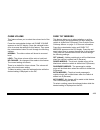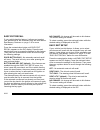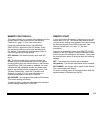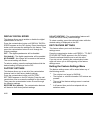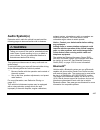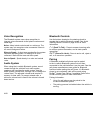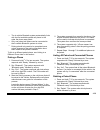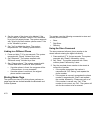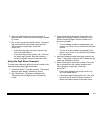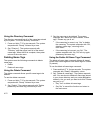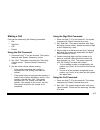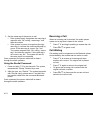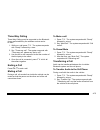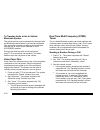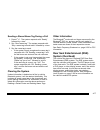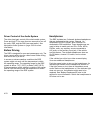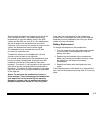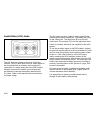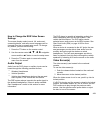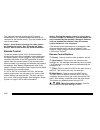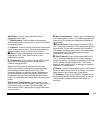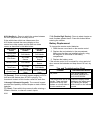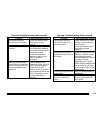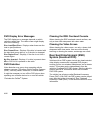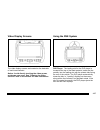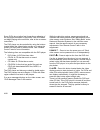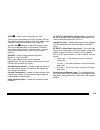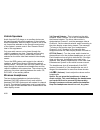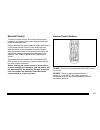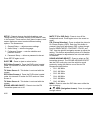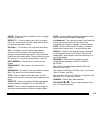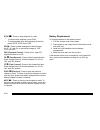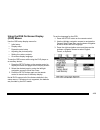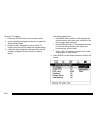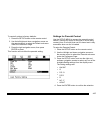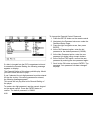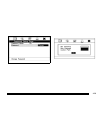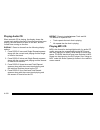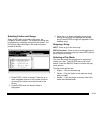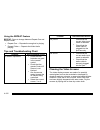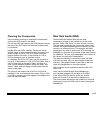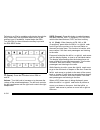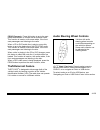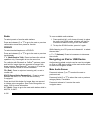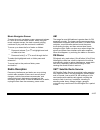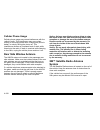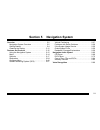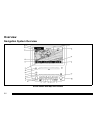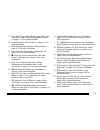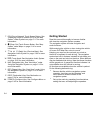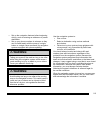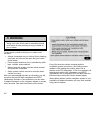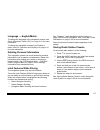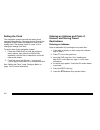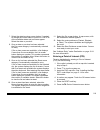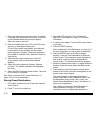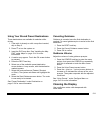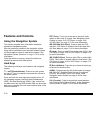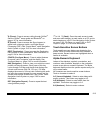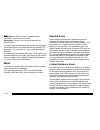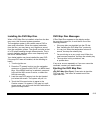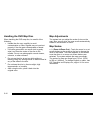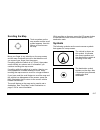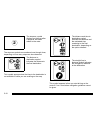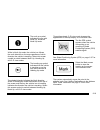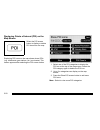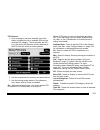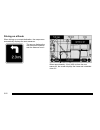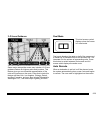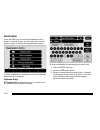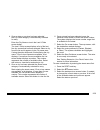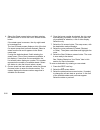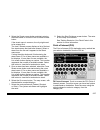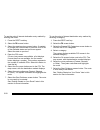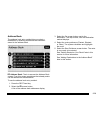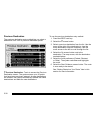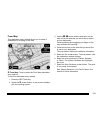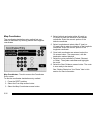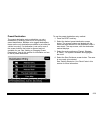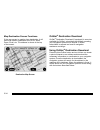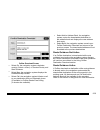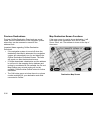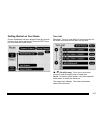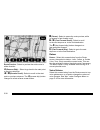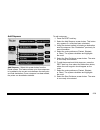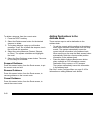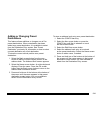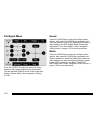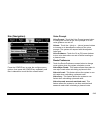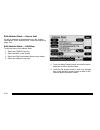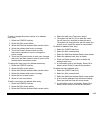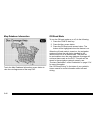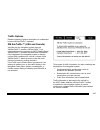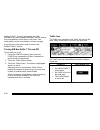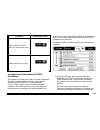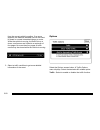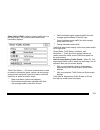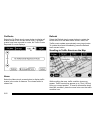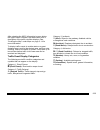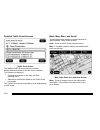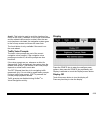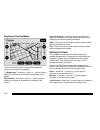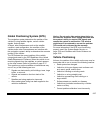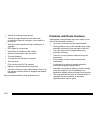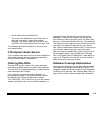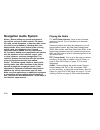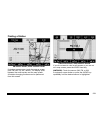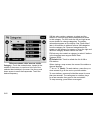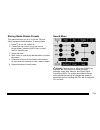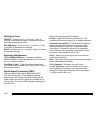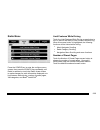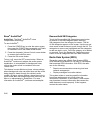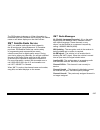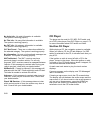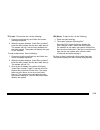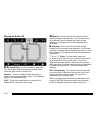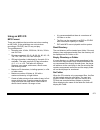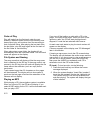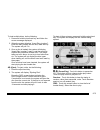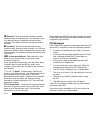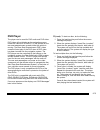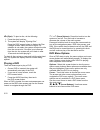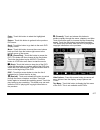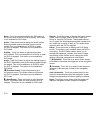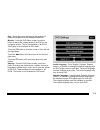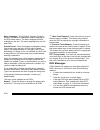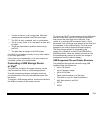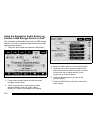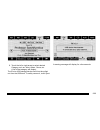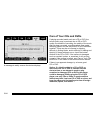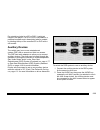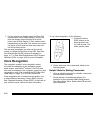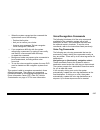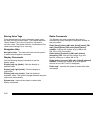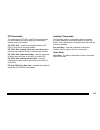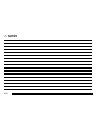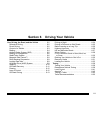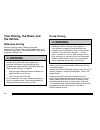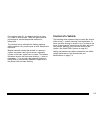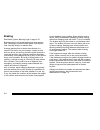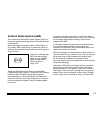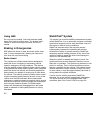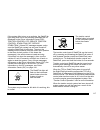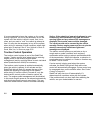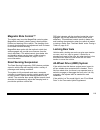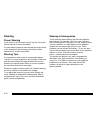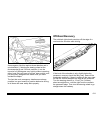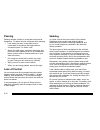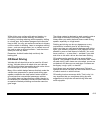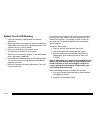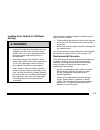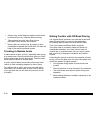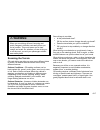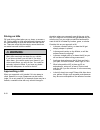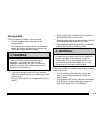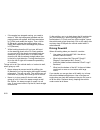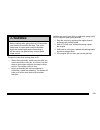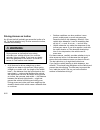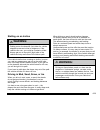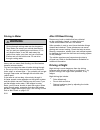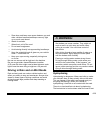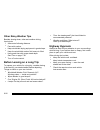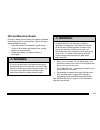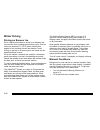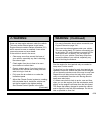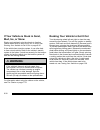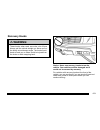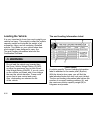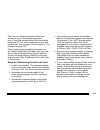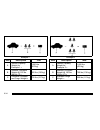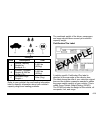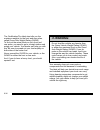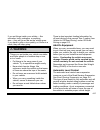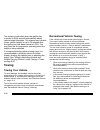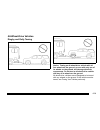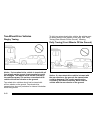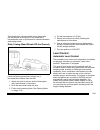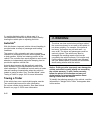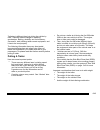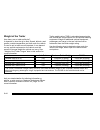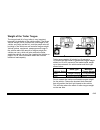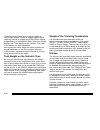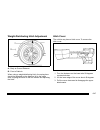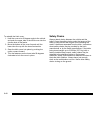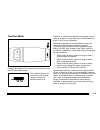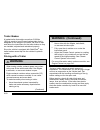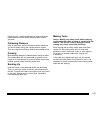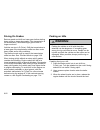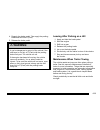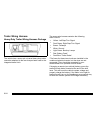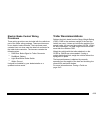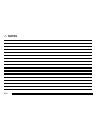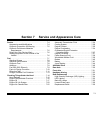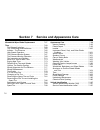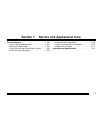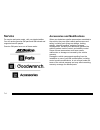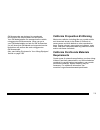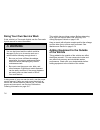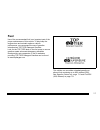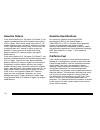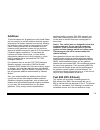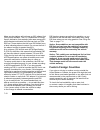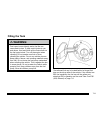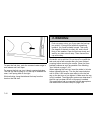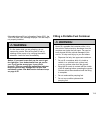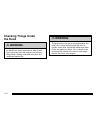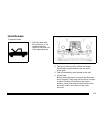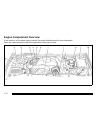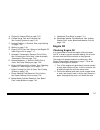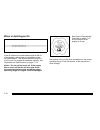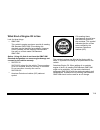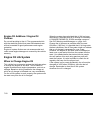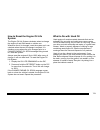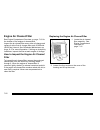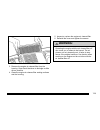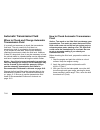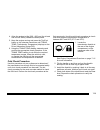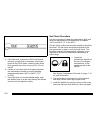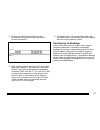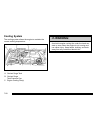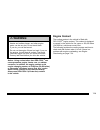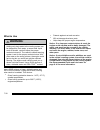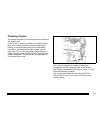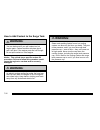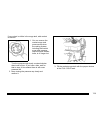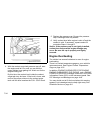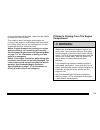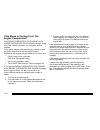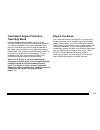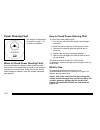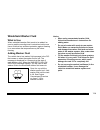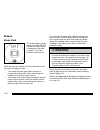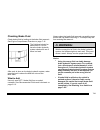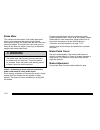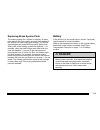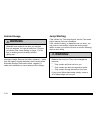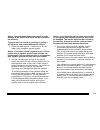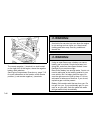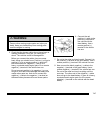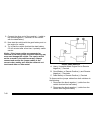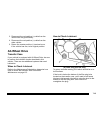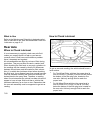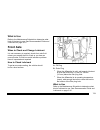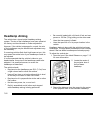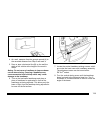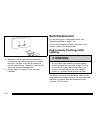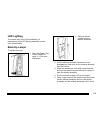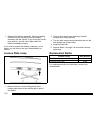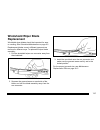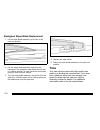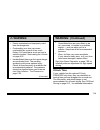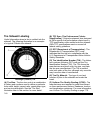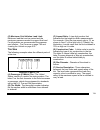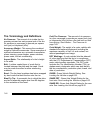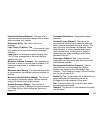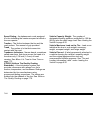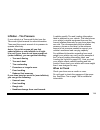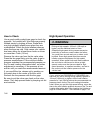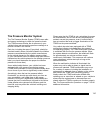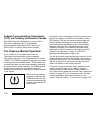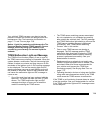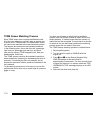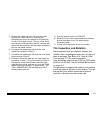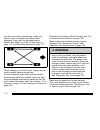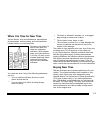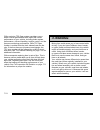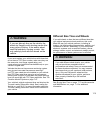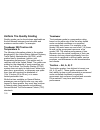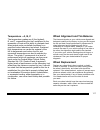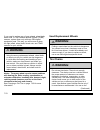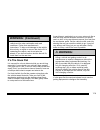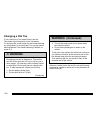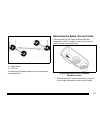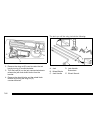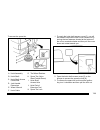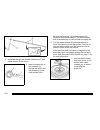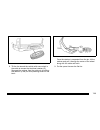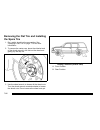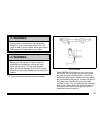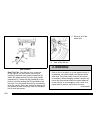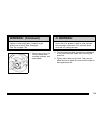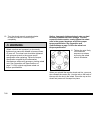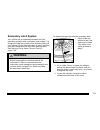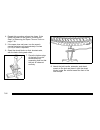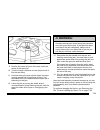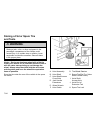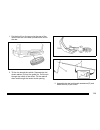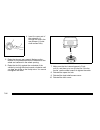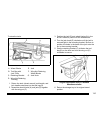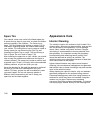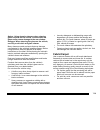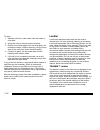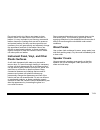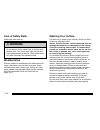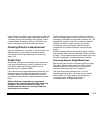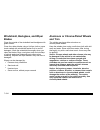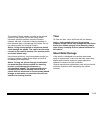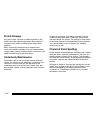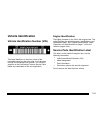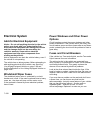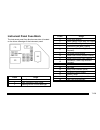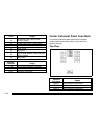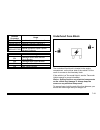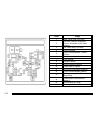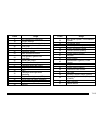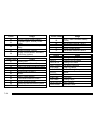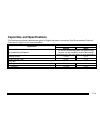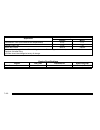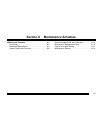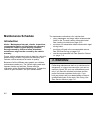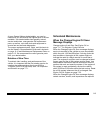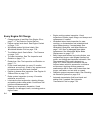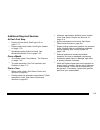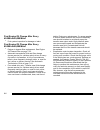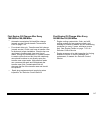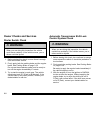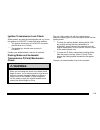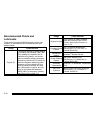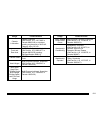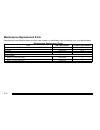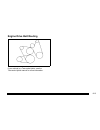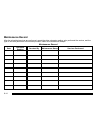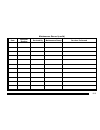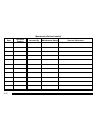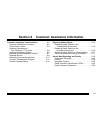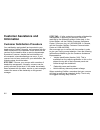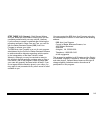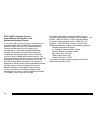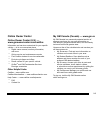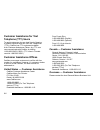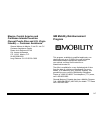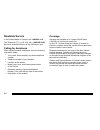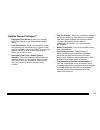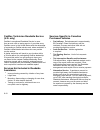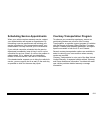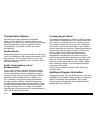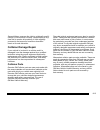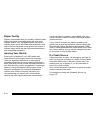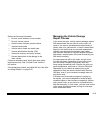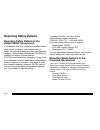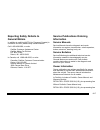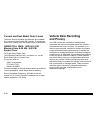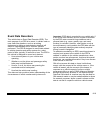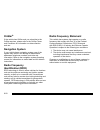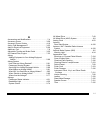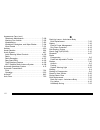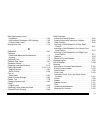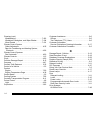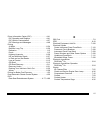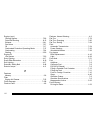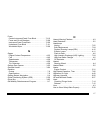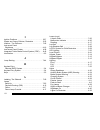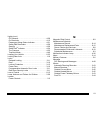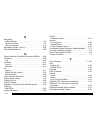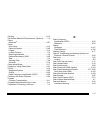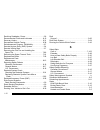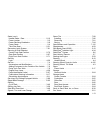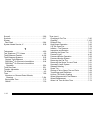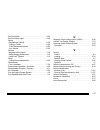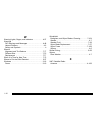- DL manuals
- Cadillac
- Automobile
- 2010 Escalade
- Owner's Manual
Cadillac 2010 Escalade Owner's Manual
2010 Cadillac Escalade/Escalade ESV Owner Manual
M
In Brief
. . . . . . . . . . . . . . . . . . . . . . . . . . . . . . . . . . . . . . . . . . . . 1-1
Instrument Panel . . . . . . . . . . . . . . . . . . . . . . . . . . . . . . . . . 1-2
Initial Drive Information . . . . . . . . . . . . . . . . . . . . . . . . . . . 1-4
Vehicle Features . . . . . . . . . . . . . . . . . . . . . . . . . . . . . . . . 1-16
Performance and Maintenance . . . . . . . . . . . . . . . . . . 1-22
Seats and Restraint System
. . . . . . . . . . . . . . . . . . . . . . 2-1
Head Restraints . . . . . . . . . . . . . . . . . . . . . . . . . . . . . . . . . . 2-2
Front Seats . . . . . . . . . . . . . . . . . . . . . . . . . . . . . . . . . . . . . . . 2-4
Rear Seats . . . . . . . . . . . . . . . . . . . . . . . . . . . . . . . . . . . . . . 2-10
Safety Belts . . . . . . . . . . . . . . . . . . . . . . . . . . . . . . . . . . . . . 2-26
Child Restraints . . . . . . . . . . . . . . . . . . . . . . . . . . . . . . . . . 2-49
Airbag System . . . . . . . . . . . . . . . . . . . . . . . . . . . . . . . . . . 2-74
Restraint System Check . . . . . . . . . . . . . . . . . . . . . . . . . 2-91
Features and Controls
. . . . . . . . . . . . . . . . . . . . . . . . . . . . 3-1
Keys . . . . . . . . . . . . . . . . . . . . . . . . . . . . . . . . . . . . . . . . . . . . . 3-3
Doors and Locks . . . . . . . . . . . . . . . . . . . . . . . . . . . . . . . . 3-10
Windows . . . . . . . . . . . . . . . . . . . . . . . . . . . . . . . . . . . . . . . . 3-18
Theft-Deterrent Systems . . . . . . . . . . . . . . . . . . . . . . . . 3-22
Starting and Operating Your Vehicle . . . . . . . . . . . . . 3-26
Mirrors . . . . . . . . . . . . . . . . . . . . . . . . . . . . . . . . . . . . . . . . . . 3-43
Object Detection Systems . . . . . . . . . . . . . . . . . . . . . . . 3-46
Universal Home Remote System . . . . . . . . . . . . . . . . 3-55
Storage Areas . . . . . . . . . . . . . . . . . . . . . . . . . . . . . . . . . . . 3-62
Sunroof . . . . . . . . . . . . . . . . . . . . . . . . . . . . . . . . . . . . . . . . . 3-66
Instrument Panel
. . . . . . . . . . . . . . . . . . . . . . . . . . . . . . . . . 4-1
Instrument Panel Overview . . . . . . . . . . . . . . . . . . . . . . . 4-3
Climate Controls . . . . . . . . . . . . . . . . . . . . . . . . . . . . . . . . 4-20
Warning Lights, Gages, and Indicators . . . . . . . . . . 4-27
Driver Information Center (DIC) . . . . . . . . . . . . . . . . . 4-41
Audio System(s) . . . . . . . . . . . . . . . . . . . . . . . . . . . . . . . . 4-67
Summary of 2010 Escalade
Page 1
2010 cadillac escalade/escalade esv owner manual m in brief . . . . . . . . . . . . . . . . . . . . . . . . . . . . . . . . . . . . . . . . . . . . 1-1 instrument panel . . . . . . . . . . . . . . . . . . . . . . . . . . . . . . . . . 1-2 initial drive information . . . . . . . . . . . . . . . . . ....
Page 2
2010 cadillac escalade/escalade esv owner manual m navigation system . . . . . . . . . . . . . . . . . . . . . . . . . . . . . . . 5-1 overview . . . . . . . . . . . . . . . . . . . . . . . . . . . . . . . . . . . . . . . . . 5-2 features and controls . . . . . . . . . . . . . . . . . . . . . . . . ...
Page 3: Canadian Owners
General motors, gm, the gm emblem, cadillac, the cadillac crest & wreath, and the names escalade and esv are registered trademarks of general motors. This manual describes features that may or may not be on your specific vehicle either because they are options that you did not purchase or due to cha...
Page 4: Warning:
Safety warnings and symbols warning messages found on vehicle labels and in this manual describe hazards and what to do to avoid or reduce them. Danger indicates a hazard with a high level of risk which will result in serious injury or death. Warning or caution indicates a hazard that could result i...
Page 5
Vehicle symbol chart here are some additional symbols that may be found on the vehicle and what they mean. For more information on the symbol, refer to the index. 0 : adjustable pedals 9 : airbag readiness light # : air conditioning ! : antilock brake system (abs) g : audio steering wheel controls o...
Page 6: Notes
2 notes vi.
Page 7: Section 1
Section 1 in brief instrument panel . . . . . . . . . . . . . . . . . . . . . . . . . . . . . . . . . . . 1-2 initial drive information . . . . . . . . . . . . . . . . . . . . . . . . . . . 1-4 remote keyless entry (rke) system . . . . . . . . . . . 1-4 remote vehicle start . . . . . . . . . . . . ....
Page 8: Instrument Panel
Instrument panel united states version shown; canada similar. 1-2.
Page 9
The main components of the instrument panel are the following: a. Outlet adjustment on page 4 ‑ 25 . B. Turn signal/multifunction lever on page 4 ‑ 4 . C. Instrument panel cluster on page 4 ‑ 28 . D. Hazard warning flashers on page 4 ‑ 3 . E. Shift lever and range selection mode. See automatic trans...
Page 10: Initial Drive Information
Initial drive information this section provides a brief overview about some of the important features that may or may not be on your specific vehicle. For more detailed information, refer to each of the features which can be found later in this owner manual. Remote keyless entry (rke) system the rke...
Page 11: Door Locks
The engine will continue to run for 10 minutes. Repeat the steps for a 10-minute time extension. Remote start can be extended only once. Canceling a remote start to cancel a remote start: . Aim the rke transmitter at the vehicle and press and hold / until the parking lamps turn off. . Turn on the ha...
Page 12: Liftgate
Liftgate power liftgate use the remote keyless entry (rke) transmitter or the power door lock switches to unlock the liftgate. There are several ways to open and close the power liftgate: . Press and hold & on the rke transmitter until the liftgate starts moving. . Press & on the overhead console in...
Page 13: Windows
Windows the power window switches are located on the driver door. In addition, each passenger door has a switch for its own window. Press the switch to lower the window. Pull the switch up to raise it. For more information, see: . Windows on page 3 ‑ 18 . . Power windows on page 3 ‑ 19 . Seat adjust...
Page 14
Raise or lower the entire seat by moving the entire control up or down. See power seats on page 2 ‑ 4 . Power lumbar to increase lumbar support, press and hold the front of the control. To decrease, press and hold the rear of the control. To raise the height of the support, press and hold the top of...
Page 15: Second Row Seats
Memory features the controls for this feature are located on the driver door, and are used to program and recall memory settings for the driver seat, outside mirrors, steering wheel position, and the adjustable throttle and brake pedal feature, if the vehicle has it. For more information, see memory...
Page 16: Heated Seats
Heated seats front seats on vehicles with heated and cooled front seats, the controls are located on the climate control panel. { (cooled seat): press to cool the entire seat. + (heated seatback): press to heat the seatback only. Z (heated seat and seatback): press to heat the seat and seatback. Con...
Page 17: Safety Belt
Safety belt refer to the following sections for important information on how to use safety belts properly. . Safety belts: they are for everyone on page 2 ‑ 26 . . How to wear safety belts properly on page 2 ‑ 30 . . Lap-shoulder belt on page 2 ‑ 39 . . Lower anchors and tethers for children (latch)...
Page 18: Mirror Adjustment
Mirror adjustment exterior mirrors vehicles with outside power mirrors and foldaway mirrors have controls located on the driver door. 1. Press (a) or (b) to select the driver or passenger side mirror. 2. Press one of the four arrows located on the control pad to adjust the mirror. 3. Press either (a...
Page 19: Steering Wheel Adjustment
Vehicles with an automatic dimming rearview mirror. The dimming feature reduces the glare of lights from behind the vehicle. The dimming feature comes on and the indicator light illuminates each time the vehicle is started. See automatic dimming rearview mirror on page 3 ‑ 43 for more information. S...
Page 20: Exterior Lighting
For more information about interior lamps, see: . Dome lamps on page 4 ‑ 17 . . Reading lamps on page 4 ‑ 17 . . Instrument panel brightness on page 4 ‑ 16 . Exterior lighting the exterior lamps control is located on the instrument panel to the left of the steering wheel. 9 : turns off the automatic...
Page 21: Windshield Wiper/washer
Windshield wiper/washer the lever is on the left side of the steering column. 8 : single wipe, turn to 8 , then release. Several wipes, hold the band on 8 longer. 9 : turns the windshield wipers off. 6 : turn the band up for more frequent wipes or down for less frequent wipes. 6 : slow wipes. ? : fa...
Page 22: Transmission
See dual automatic climate control system on page 4 ‑ 20 and rear air conditioning and heating system and electronic climate controls on page 4 ‑ 26 (if equipped). Transmission driver shift control (dsc) the dsc switch is located on the shift lever. To enable the dsc feature, move the column shift l...
Page 23: Portable Audio Devices
Portable audio devices this vehicle may have an auxilliary input, located on the audio faceplate and a usb port located in the center console. External devices such as ipod ® , laptop computers, mp3 players, cd changers, usb storage device, etc. Can be connected to the auxiliary port using a 3.5 mm ...
Page 24: Bluetooth
Bluetooth ® for vehicles with an in-vehicle bluetooth system, it allows users with a bluetooth enabled cell phone to make and receive hands-free calls using the vehicle ’ s audio system and controls. The bluetooth enabled cell phone must be paired with the in-vehicle bluetooth system before it can b...
Page 25
T (vehicle information): press this button to display the oil life, units, side blind zone system on/off, tire pressure readings for vehicles with the tire pressure monitor system (tpms), remote keyless entry (rke) transmitter programming, compass zone setting, and compass recalibration. U (customiz...
Page 26: Cruise Control
Cruise control cruise control shown with heated steering wheel button (if equipped) the cruise control buttons are located on left side of the steering wheel. T : turns the system on or off. The indicator light is on when cruise control is on and turns off when cruise control is off. + res : press t...
Page 27: Rear Vision Camera (Rvc)
Rear vision camera (rvc) the rear vision camera displays a view of the area behind the vehicle on the navigation screen when the vehicle is shifted into r (reverse). Once shifted out of r (reverse), the navigation screen will go back to the last screen that had been displayed, after a delay. To clea...
Page 28: Stabilitrak
Performance and maintenance stabilitrak ® the vehicle may have a traction control system that limits wheel spin and the stabilitrak system that assists with directional control of the vehicle in difficult driving conditions. Both systems turn on automatically every time the vehicle is started. . To ...
Page 29: Engine Oil Life System
Note: the tire pressure monitor can alert you about low tire pressure, but it does not replace normal monthly tire maintenance. It is the driver ’ s responsibility to maintain correct tire pressures. See tire pressure monitor system on page 7 ‑ 67 and tire pressure monitor operation on page 7 ‑ 68 ....
Page 30: Roadside Service
Roadside service u.S. Or canada: 1-800-882-1112 tty users: 1-888-889-2438 as the owner of a new cadillac, you are automatically enrolled in the roadside service program which is available 24 hours a day, 365 days a year. Roadside service and onstar if you have a current onstar subscription, press th...
Page 31
How onstar service works q : this blue button connects you to a specially trained onstar advisor to verify your account information and to answer questions. ] : push this red emergency button to get priority help from specially trained onstar emergency advisors. X : push this button for hands ‐ free...
Page 32
The onstar system can record and transmit vehicle information. This information is automatically sent to an onstar call center when q is pressed, ] is pressed, or if the airbags or acr system deploy. This information usually includes the vehicle's gps location and, in the event of a crash, additiona...
Page 33: Section 2
Section 2 seats and restraint system head restraints . . . . . . . . . . . . . . . . . . . . . . . . . . . . . . . . . . . . 2-2 front seats . . . . . . . . . . . . . . . . . . . . . . . . . . . . . . . . . . . . . . . . . 2-4 power seats . . . . . . . . . . . . . . . . . . . . . . . . . . . . . . ....
Page 34: Head Restraints
Head restraints the front seats have adjustable head restraints in the outboard seating positions. { caution: with head restraints that are not installed and adjusted properly, there is a greater chance that occupants will suffer a neck/spinal injury in a crash. Do not drive until the head restraint...
Page 35
Pull the head restraint up to raise it. To lower the head restraint, press the button, located on the top of the seatback, and push the restraint down. Push down on the head restraint after the button is released to make sure that it is locked in place. The head restraints are not designed to be rem...
Page 36: Front Seats
Front seats power seats driver seat with power seat control, power recline, and power lumbar shown the power seat controls are located on the outboard side of the front seats. . Move the seat forward or rearward by sliding the control forward or rearward. . Raise or lower the front part of the seat ...
Page 37: Power Lumbar
Power lumbar the controls used to operate the power lumbar feature are located on the outboard side of the seats. . To increase lumbar support, press and hold the front of the control. . To decrease lumbar support, press and hold the rear of the control. . To raise the height of the support, press a...
Page 38: Memory Features
This symbol will appear on the climate control display to indicate that the feature is on. Press the button to cycle through the temperature settings of high, medium, and low and to turn the cooled seat off. Indicator bars next to the symbol designate the level of cooling selected: three for high, t...
Page 39
To save your positions in memory, do the following: 1. Adjust the driver's seat, including the seatback recliner and lumbar, both outside mirrors, steering wheel, and the throttle and brake pedals to a comfortable position. See outside power foldaway mirrors on page 3 ‑ 43 and adjustable throttle an...
Page 40: Power Reclining Seatbacks
Easy exit seat the control for this feature is located on the driver ’ s door between buttons 1 and 2. With the vehicle in p (park), the exit position can be recalled by pressing the exit button. You will hear a single beep. The driver ’ s seat will move back. If the easy exit seat feature is on in ...
Page 41: Warning:
{ warning: sitting in a reclined position when your vehicle is in motion can be dangerous. Even if you buckle up, your safety belts cannot do their job when you are reclined like this. The shoulder belt cannot do its job. In a crash, you could go into it, receiving neck or other injuries. The lap be...
Page 42: Rear Seats
Rear seats heated seats driver's side rsa heated seat button only shown the rear outboard seats have the heated seat feature. The buttons used to control this feature are located on the rear seat audio (rsa) panel. M (heated seat): to heat the seat cushion, press the button with the heated seat symb...
Page 43
2. Lift the lever, located on the outboard side of the seat, to release the seatback. The seatback will fold forward automatically. Leaving the seatback in this position creates a flat load floor. If the seatback cannot fold flat, try moving the front seat forward and/or put the front seatback in th...
Page 44: Warning:
3. Lift the same lever again to release the rear of the seat from the floor. The seat will tumble forward. Folding and tumbling the seat(s) from the third row seats { warning: using the third row seating position while the second row is folded, or folded and tumbled, could cause injury in a sudden s...
Page 45: Warning:
2. Lift the lever(s), located on the bottom rear of the second row seat(s) on the inboard side, to release the seatback. The seatback will fold forward. 3. Lift the same lever again to release the rear of the seat from the floor. The seat will tumble forward automatically. Automatic seat release fol...
Page 46: Warning:
Folding and tumbling the second row seat(s) from the third row seats or outside { warning: using the third row seating position while the second row is folded, or folded and tumbled, could cause injury in a sudden stop or crash. Be sure to return the seat to the passenger seating position. Push and ...
Page 47: Warning:
Returning the seat(s) to the sitting position to return the seat to the sitting position: 1. Pull the seat down until it latches to the floor. The seatback cannot be raised if the seat is not latched to the floor. { warning: if either seatback is not locked, it could move forward in a sudden stop or...
Page 48: Warning:
Reclining seatbacks to recline the seatback, do the following: 1. Lift the lever located on the outboard side of the seat. 2. Move the seatback to the desired position, then release the lever to lock the seatback in place. 3. Push and pull on the seatback to make sure it is locked. To return the sea...
Page 49
Manual fold and tumble feature folding and tumbling the seat(s) to fold and tumble the seat, do the following: 1. Make sure that there is nothing under, in front of, or on the seat. Notice: folding a rear seat with the safety belts still fastened may cause damage to the seat or the safety belts. Alw...
Page 50
The seatback will fold forward. Leaving the seatback in this position creates a flat load floor. If the seatback cannot fold flat, try moving the front seat forward and/or put the front seatback in the upright position. 3. Lift the lever again to release the rear of the seat from the floor. The seat...
Page 51: Warning:
Folding and tumbling the seat(s) from the third row seats { warning: using the third row seating position while the second row is folded, or folded and tumbled, could cause injury in a sudden stop or crash. Be sure to return the seat to the passenger seating position. Push and pull on the seat to ma...
Page 52: Warning:
Automatic seat release fold and tumble feature the transmission must be in (p) for this feature to work. { warning: automatically folding and tumbling the seat when someone is sitting in the seat, could cause injury to the person sitting there. Always make sure there is no one sitting in the seat be...
Page 53: Warning:
Driver's side rear panel button shown 2. Press the automatic seat release button located on the panel behind the rear doors. One press of the button automatically folds the seatback flat and tumbles the seat forward. There will be a slight delay between the folding of the seatback and the tumbling o...
Page 54: Warning:
Folding the seatback(s) notice: folding a rear seat with the safety belts still fastened may cause damage to the seat or the safety belts. Always unbuckle the safety belts and return them to their normal stowed position before folding a rear seat. To fold the seatback, do the following: 1. Open the ...
Page 55
Tumbling the third row seat the seat can be tumbled forward for additional cargo space. To tumble the seat, do the following: 1. Open the liftgate to access the controls for the seat. 2. Make sure the head rests are completely lowered, there is nothing under, in front of, or on the seat. 3. Fold the...
Page 56: Warning:
4. Pull the seat down until it latches to the floor. The seatback cannot be raised if the seat is not latched to the floor. 5. Pull up on the seatback until it locks into the upright position. { warning: if either seatback is not locked, it could move forward in a sudden stop or crash. That could ca...
Page 57: Warning:
Installing the third row seat to install the seat, do the following: 1. Open the liftgate to access the rear of the vehicle. 2. Slide the front outboard seat wheels into the track on the floor and roll the seat forward. The front latches should lock into place. If the latches do not lock, try tiltin...
Page 58: Safety Belts
Safety belts safety belts: they are for everyone this section of the manual describes how to use safety belts properly. It also describes some things not to do with safety belts. { warning: do not let anyone ride where a safety belt cannot be worn properly. In a crash, if you or your passenger(s) ar...
Page 59
After more than 40 years of safety belts in vehicles, the facts are clear. In most crashes buckling up does matter ... A lot! Why safety belts work when you ride in or on anything, you go as fast as it goes. Take the simplest vehicle. Suppose it is just a seat on wheels. Put someone on it. 2-27.
Page 60
Get it up to speed. Then stop the vehicle. The rider does not stop. The person keeps going until stopped by something. In a real vehicle, it could be the windshield... 2-28.
Page 61
Or the instrument panel... Or the safety belts! With safety belts, you slow down as the vehicle does. You get more time to stop. You stop over more distance, and your strongest bones take the forces. That is why safety belts make such good sense. 2-29.
Page 62
Questions and answers about safety belts q: will i be trapped in the vehicle after a crash if i am wearing a safety belt? A: you could be — whether you are wearing a safety belt or not. But your chance of being conscious during and after an accident, so you can unbuckle and get out, is much greater ...
Page 63
First, before you or your passenger(s) wear a safety belt, there is important information you should know. Sit up straight and always keep your feet on the floor in front of you. The lap part of the belt should be worn low and snug on the hips, just touching the thighs. In a crash, this applies forc...
Page 64: Warning:
Q: what is wrong with this? A: the shoulder belt is too loose. It will not give as much protection this way. { warning: you can be seriously hurt if your shoulder belt is too loose. In a crash, you would move forward too much, which could increase injury. The shoulder belt should fit snugly against ...
Page 65: Warning:
Q: what is wrong with this? A: the lap belt is too loose. It will not give nearly as much protection this way. { warning: you can be seriously hurt if your lap belt is too loose. In a crash, you could slide under the lap belt and apply force on your abdomen. This could cause serious or even fatal in...
Page 66: Warning:
Q: what is wrong with this? A: the belt is buckled in the wrong buckle. { warning: you can be seriously injured if your belt is buckled in the wrong place like this. In a crash, the belt would go up over your abdomen. The belt forces would be there, not on the pelvic bones. This could cause serious ...
Page 67: Warning:
Q: what is wrong with this? A: the belt is over an armrest. { warning: you can be seriously injured if your belt goes over an armrest like this. The belt would be much too high. In a crash, you can slide under the belt. The belt force would then be applied on the abdomen, not on the pelvic bones, an...
Page 68: Warning:
Q: what is wrong with this? A: the shoulder belt is worn under the arm. It should be worn over the shoulder at all times. { warning: you can be seriously injured if you wear the shoulder belt under your arm. In a crash, your body would move too far forward, which would increase the chance of head an...
Page 69: Warning:
Q: what is wrong with this? A: the belt is behind the body. { warning: you can be seriously injured by not wearing the lap-shoulder belt properly. In a crash, you would not be restrained by the shoulder belt. Your body could move too far forward increasing the chance of head and neck injury. You mig...
Page 70: Warning:
Q: what is wrong with this? A: the belt is twisted across the body. { warning: you can be seriously injured by a twisted belt. In a crash, you would not have the full width of the belt to spread impact forces. If a belt is twisted, make it straight so it can work properly, or ask your dealer/retaile...
Page 71: Lap-Shoulder Belt
Lap-shoulder belt all seating positions in the vehicle have a lap-shoulder belt except for the center front passenger position, if equipped, which has a lap belt. See lap belt on page 2 ‑ 47 for more information. The lap ‐ shoulder belts for the first and second row seating positions are equipped wi...
Page 72
If the shoulder portion of a passenger belt with a free ‐ falling latch plate is pulled out all the way, the child restraint locking feature may be engaged. If this happens, let the belt go back all the way and start again. Engaging the child restraint locking feature in the right front seating posi...
Page 73
3. Push the latch plate into the buckle until it clicks. If you find that the latch plate will not go fully into the buckle, see if you are using the correct buckle. Pull up on the latch plate to make sure it is secure. If the belt is not long enough, see safety belt extender on page 2 ‑ 48 . Positi...
Page 74
To unlatch the belt, push the button on the buckle. The belt should return to its stowed position. Before a door is closed, be sure the safety belt is out of the way. If a door is slammed against a safety belt, damage can occur to both the belt and the vehicle. Shoulder belt height adjuster the vehi...
Page 75
The adjuster can be moved up just by pushing up on the shoulder belt guide. After the adjuster is set to the desired position, try to move it down without squeezing the buttons to make sure it has locked into position. Safety belt pretensioners this vehicle has safety belt pretensioners for front ou...
Page 76
There is one guide, if equipped, for each outside passenger position in the second row seat and the third row, if the vehicle has one. Here is how to install a comfort guide to the safety belt: second row 1. For the second row, remove the guide from its storage clip on the interior body. Third row i...
Page 77
2. Place the guide over the belt, and insert the two edges of the belt into the slots of the guide. 3. Be sure that the belt is not twisted and it lies flat. The elastic cord must be under the belt and the guide on top. 2-45.
Page 78: Warning:
{ warning: a safety belt that is not properly worn may not provide the protection needed in a crash. The person wearing the belt could be seriously injured. The shoulder belt should go over the shoulder and across the chest. These parts of the body are best able to take belt restraining forces. 4. B...
Page 79: Lap Belt
Safety belt use during pregnancy safety belts work for everyone, including pregnant women. Like all occupants, they are more likely to be seriously injured if they do not wear safety belts. A pregnant woman should wear a lap-shoulder belt, and the lap portion should be worn as low as possible, below...
Page 80: Safety Belt Extender
To make the belt shorter, pull its free end as shown until the belt is snug. If the belt is not long enough, see safety belt extender on page 2 ‑ 48 . Make sure the release button on the buckle is positioned so you would be able to unbuckle the safety belt quickly if necessary. If you find that the ...
Page 81: Child Restraints
Child restraints older children older children who have outgrown booster seats should wear the vehicle's safety belts. The manufacturer's instructions that come with the booster seat, state the weight and height limitations for that booster. Use a booster seat with a lap-shoulder belt until the chil...
Page 82: Warning:
Q: what is the proper way to wear safety belts? A: an older child should wear a lap-shoulder belt and get the additional restraint a shoulder belt can provide. The shoulder belt should not cross the face or neck. The lap belt should fit snugly below the hips, just touching the top of the thighs. Thi...
Page 83: Warning:
{ warning: never do this. Never allow a child to wear the safety belt with the shoulder belt behind their back. A child can be seriously injured by not wearing the lap-shoulder belt properly. In a crash, the child would not be restrained by the shoulder belt. The child could move too far forward inc...
Page 84: Warning:
Infants and young children everyone in a vehicle needs protection! This includes infants and all other children. Neither the distance traveled nor the age and size of the traveler changes the need, for everyone, to use safety restraints. In fact, the law in every state in the united states and in ev...
Page 85: Warning:
{ warning: never do this. Children who are up against, or very close to, any airbag when it inflates can be seriously injured or killed. Never put a rear-facing child restraint in the right front seat. Secure a rear-facing child restraint (continued) warning: (continued) in a rear seat. It is also b...
Page 86: Warning:
Q: what are the different types of add-on child restraints? A: add-on child restraints, which are purchased by the vehicle's owner, are available in four basic types. Selection of a particular restraint should take into consideration not only the child's weight, height, and age but also whether or n...
Page 87: Warning:
{ warning: a young child's hip bones are still so small that the vehicle's regular safety belt may not remain low on the hip bones, as it should. Instead, it may settle up around the child's abdomen. In a crash, the belt would apply force on a body area that is unprotected by any bony structure. Thi...
Page 88: Warning:
A booster seat (c-d) is a child restraint designed to improve the fit of the vehicle's safety belt system. A booster seat can also help a child to see out the window. Securing an add-on child restraint in the vehicle { warning: a child can be seriously injured or killed in a crash if the child restr...
Page 89: Warning:
When securing an add-on child restraint, refer to the instructions that come with the restraint which may be on the restraint itself or in a booklet, or both, and to this manual. The child restraint instructions are important, so if they are not available, obtain a replacement copy from the manufact...
Page 90: Warning:
A label on your sun visor says, “ never put a rear-facing child seat in the front. ” this is because the risk to the rear-facing child is so great, if the airbag deploys. { warning: a child in a rear-facing child restraint can be seriously injured or killed if the right front passenger airbag inflat...
Page 91: Warning:
{ warning: a child in a child restraint in the center front seat can be badly injured or killed by the frontal airbags if they inflate. Never secure a child restraint in the center front seat. It is always better to secure a child restraint in a rear seat. Do not use child restraints in the center f...
Page 92
Lower anchors lower anchors (a) are metal bars built into the vehicle. There are two lower anchors for each latch seating position that will accommodate a child restraint with lower attachments (b). Top tether anchor a top tether (a, c) anchors the top of the child restraint to the vehicle. A top te...
Page 93
Some child restraints with top tethers are designed for use with or without the top tether being attached. Others require the top tether always to be attached. In canada, the law requires that forward-facing child restraints have a top tether, and that the tether be attached. Be sure to read and fol...
Page 94
For models with a three passenger third row seat, see the information following for installing a child restraint with a top tether in the third row, if your vehicle has one. Never install two top tethers using the same top tether anchor. For models with 60/40 second row seating, the rear right side ...
Page 95
Second row seat — 60/40 for models with 60/40 second row seating, the top tether anchors are located at the bottom rear of the seat cushion for each seating position in the second row. Be sure to use an anchor located on the same side of the vehicle as the seating position where the child restraint ...
Page 96: Warning:
According to accident statistics, children and infants are safer when properly restrained in a child restraint system or infant restraint system secured in a rear seating position. See where to put the restraint on page 2 ‑ 57 securing a child restraint designed for the latch system { warning: if a ...
Page 97
Notice: do not let the latch attachments rub against the vehicle ’ s safety belts. This may damage these parts. If necessary, move buckled safety belts to avoid rubbing the latch attachments. Do not fold the empty rear seat with a safety belt buckled. This could damage the safety belt or the seat. U...
Page 98
If the position you are using does not have a headrest or head restraint and you are using a dual tether, route the tether over the seatback. If the position you are using has an adjustable headrest or head restraint and you are using a dual tether, route the tether around the headrest or head restr...
Page 99: Seat Position
Securing a child restraint in a rear seat position when securing a child restraint in a rear seating position, study the instructions that came with the child restraint to make sure it is compatible with this vehicle. If the child restraint has the latch system, see lower anchors and tethers for chi...
Page 100
Use the following pictures to determine the latch plate style: free ‐ falling latch plate cinching latch plate 1. Put the child restraint on the seat. 2. Pick up the latch plate, and run the lap and shoulder portions of the vehicle's safety belt through or around the restraint. The child restraint i...
Page 101
3. Push the latch plate into the buckle until it clicks. Position the release button on the buckle so that the safety belt could be quickly unbuckled if necessary. 4. For passenger seating positions with a lap ‐ shoulder belt and a free ‐ falling latch plate, pull the rest of the shoulder belt all t...
Page 102: Warning:
5. To tighten the belt, push down on the child restraint, pull the shoulder portion of the belt to tighten the lap portion of the belt and feed the shoulder belt back into the retractor. When installing a forward-facing child restraint, it may be helpful to use your knee to push down on the child re...
Page 103: Right Front Seat Position
Securing a child restraint in the right front seat position this vehicle has airbags. A rear seat is a safer place to secure a forward-facing child restraint. See where to put the restraint on page 2 ‑ 57 . In addition, the vehicle may have a passenger sensing system which is designed to turn off th...
Page 104
If the child restraint has the latch system, see lower anchors and tethers for children (latch) on page 2 ‑ 59 for how and where to install the child restraint using latch. If a child restraint is secured using a safety belt and it uses a top tether, see lower anchors and tethers for children (latch...
Page 105
5. Pull the rest of the shoulder belt all the way out of the retractor to set the lock. 6. To tighten the belt, push down on the child restraint, pull the shoulder portion of the belt to tighten the lap portion of the belt and feed the shoulder belt back into the retractor. When installing a forward...
Page 106: Airbag System
If the vehicle is equipped with the passenger sensing system, and when the passenger sensing system has turned off the right front passenger frontal airbag, the off indicator in the passenger airbag status indicator should light and stay lit when you start the vehicle. See passenger airbag status in...
Page 107: Warning:
Here are the most important things to know about the airbag system: { warning: you can be severely injured or killed in a crash if you are not wearing your safety belt — even if you have airbags. Airbags are designed to work with safety belts, but do not replace them. Also, airbags are not designed ...
Page 108: Warning:
{ warning: children who are up against, or very close to, any airbag when it inflates can be seriously injured or killed. Airbags plus lap-shoulder belts offer protection for adults and older children, but not for young children and infants. Neither the vehicle's safety belt system nor its airbag sy...
Page 109: Where Are The Airbags?
Where are the airbags? The driver's frontal airbag is in the middle of the steering wheel. The right front passenger's frontal airbag is in the instrument panel on the passenger's side. 2-77.
Page 110
Driver side shown, passenger side similar if the vehicle has seat ‐ mounted side impact airbags for the driver and right front passenger, they are in the side of the seatbacks closest to the door. Driver side shown, passenger side similar the roof-rail airbags for the driver, right front passenger, ...
Page 111: Warning:
Driver side shown, passenger side similar if the vehicle has a third row passenger seat, the roof-rail airbags are located in the ceiling above the rear windows for the outboard passenger positions in the third row. { warning: if something is between an occupant and an airbag, the airbag might not i...
Page 112
When should an airbag inflate? Frontal airbags are designed to inflate in moderate to severe frontal or near-frontal crashes to help reduce the potential for severe injuries mainly to the driver's or right front passenger's head and chest. However, they are only designed to inflate if the impact exc...
Page 113
The vehicle may or may not have seat ‐ mounted side impact airbags. The vehicle has roof-rail airbags. See airbag system on page 2 ‑ 74 . Seat ‐ mounted side impact airbags and roof-rail airbags are intended to inflate in moderate to severe side crashes. In addition, these roof-rail airbags are inte...
Page 114: Inflates?
Rollover capable roof-rail airbags are designed to help contain the head and chest of occupants in the outboard seating positions in the first, second, and third rows, if equipped with a third row seat. The rollover capable roof-rail airbags are designed to help reduce the risk of full or partial ej...
Page 115: Warning:
{ warning: a crash severe enough to inflate the airbags may have also damaged important functions in the vehicle, such as the fuel system, brake and steering systems, etc. Even if the vehicle appears to be drivable after a moderate crash, there may be concealed damage that could make it difficult to...
Page 116: Passenger Sensing System
Passenger sensing system if the vehicle has the passenger airbag status indicator pictured in the following illustration, then the vehicle has a passenger sensing system for the right front passenger position. The passenger airbag status indicator, if equipped, is visible on the overhead console whe...
Page 117: Warning:
{ warning: a child in a rear-facing child restraint can be seriously injured or killed if the right front passenger airbag inflates. This is because the back of the rear-facing child restraint would be very close to the inflating airbag. A child in a forward-facing child restraint can be seriously i...
Page 118: Warning:
For some children, including children in child restraints, and for very small adults, the passenger sensing system may or may not turn off the right front passenger frontal airbag, depending upon the person's seating posture and body build. Everyone in your vehicle who has outgrown child restraints ...
Page 119
If the off indicator is lit for an adult-size occupant if a person of adult-size is sitting in the right front passenger seat, but the off indicator is lit, it could be because that person is not sitting properly in the seat. If this happens, use the following steps to allow the system to detect tha...
Page 120: Warning:
Additional factors affecting system operation safety belts help keep the passenger in position on the seat during vehicle maneuvers and braking, which helps the passenger sensing system maintain the passenger airbag status. See “ safety belts ” and “ child restraints ” in the index for additional in...
Page 121: Vehicle
Servicing your airbag-equipped vehicle airbags affect how the vehicle should be serviced. There are parts of the airbag system in several places around the vehicle. Your dealer/retailer and the service manual have information about servicing the vehicle and the airbag system. To purchase a service m...
Page 122
Different vehicle. Any object, such as an aftermarket seat heater or a comfort enhancing pad or device, installed under or on top of the seat fabric, could also interfere with the operation of the passenger sensing system. This could either prevent proper deployment of the passenger airbag(s) or pre...
Page 123: Restraint System Check
Restraint system check checking the restraint systems safety belts now and then, check that the safety belt reminder light, safety belts, buckles, latch plates, retractors, and anchorages are all working properly. Look for any other loose or damaged safety belt system parts that might keep a safety ...
Page 124: After A Crash
Replacing restraint system parts after a crash { warning: a crash can damage the restraint systems in your vehicle. A damaged restraint system may not properly protect the person using it, resulting in serious injury or even death in a crash. To help make sure your restraint systems are working prop...
Page 125: Section 3
Section 3 features and controls keys . . . . . . . . . . . . . . . . . . . . . . . . . . . . . . . . . . . . . . . . . . . . . . . . 3-3 remote keyless entry (rke) system . . . . . . . . . . . 3-4 remote keyless entry (rke) system operation . . . . . . . . . . . . . . . . . . . . . . . . . . . . . ....
Page 126: Section 3
Section 3 features and controls mirrors . . . . . . . . . . . . . . . . . . . . . . . . . . . . . . . . . . . . . . . . . . . . 3-43 manual rearview mirror . . . . . . . . . . . . . . . . . . . . . . . . 3-43 automatic dimming rearview mirror . . . . . . . . . . . 3-43 outside power foldaway mirrors...
Page 127: Keys
Keys { warning: leaving children in a vehicle with the ignition key is dangerous for many reasons, children or others could be badly injured or even killed. They could operate the power windows or other controls or even make the vehicle move. The windows will function with the keys in the ignition a...
Page 128: Operation
Remote keyless entry (rke) system see radio frequency statement on page 9 ‑ 20 for information regarding part 15 of the federal communications commission (fcc) rules and rss-210/211 of industry and science canada. Changes or modifications to this system by other than an authorized service facility c...
Page 129
The following functions may be available if this vehicle has the rke system: q (lock): press to lock all the doors. If enabled through the driver information center (dic), the turn signal lamps flash once to indicate locking has occurred. If enabled through the dic, the horn chirps when q is pressed...
Page 130
The vehicle comes with two transmitters. Each transmitter will have a number on top of it, “ 1 ” or “ 2 ” . These numbers correspond to the driver of the vehicle. For example, the memory seat position for driver 1 will be recalled when using the transmitter labeled “ 1 ” , if enabled through the dic...
Page 131: Remote Vehicle Start
To replace the battery: 1. Separate the transmitter with a flat, thin object inserted into the notch, located above the metal base. 2. Remove the old battery. Do not use a metal object. 3. Insert the new battery, positive side facing up. Replace with a cr2032 or equivalent battery. 4. Snap the trans...
Page 132
If your vehicle has the remote start feature, the rke transmitter functions will have an increased range of operation. However, the range may be less while the vehicle is running. There are other conditions which can affect the performance of the transmitter, see remote keyless entry (rke) system on...
Page 133
For example, if the lock button and then the remote start buttons are pressed again after the vehicle has been running for five minutes, 10 minutes are added, allowing the engine to run for 15 minutes. The additional ten minutes are considered a second remote vehicle start. After your vehicles engin...
Page 134: Doors And Locks
Doors and locks door locks { warning: unlocked doors can be dangerous. . Passengers, especially children, can easily open the doors and fall out of a moving vehicle. When a door is locked, the handle will not open it. The chance of being thrown out of the vehicle in a crash is increased if the doors...
Page 135: Delayed Locking
Delayed locking when locking the doors with the power lock switch and a door or the liftgate is open, the doors will lock five seconds after the last door is closed. You will hear three chimes to signal that the delayed locking feature is in use. Pressing the power lock switch twice will override th...
Page 136: Lockout Protection
When you want to open a rear door when the security lock is on, do the following: 1. Unlock the door by lifting the rear door manual lock, using the power door lock switch, or the remote keyless entry (rke) transmitter, if the vehicle has one. 2. Open the door from the outside. To cancel the rear do...
Page 137
See power liftgate on page 3 ‑ 14 for more information on how to use the power liftgate. To unlock the liftgate, use the power door lock switch or press the door unlock button on the remote keyless entry (rke) transmitter twice. See remote keyless entry (rke) system operation on page 3 ‑ 4 . On vehi...
Page 138: Power Liftgate
Power liftgate power liftgate operation { warning: exhaust gases can enter the vehicle if it is driven with the liftgate, trunk/hatch open, or with any objects that pass through the seal between the body and the trunk/hatch or liftgate. Engine exhaust contains carbon monoxide (co) which cannot be se...
Page 139: Warning:
On vehicles with a power liftgate the button is located on the overhead console. The vehicle must be in p (park) to use the power liftgate feature. & : press the top of the button to open or close the power liftgate. Off : press the bottom of the button for manual operation of the power liftgate. Th...
Page 140
Pressing the buttons, or touchpad switch a second time while the liftgate is moving reverses the direction. L : the liftgate can also be closed by pressing the power liftgate button next to the liftgate latch. Press the button a second time during liftgate operation to reverse that operation. The po...
Page 141: Power Assist Steps
Manual operation of power liftgate to change the liftgate to manual operation, press the switch on the overhead console to the off position. With the power liftgate disabled and all of the doors unlocked, the liftgate can be manually opened and closed. To open the liftgate, press the touchpad on the...
Page 142: Windows
Windows { warning: leaving children, helpless adults, or pets in a vehicle with the windows closed is dangerous. They can be overcome by the extreme heat and suffer permanent injuries or even death from heat stroke. Never leave a child, a helpless adult, or a pet alone in a vehicle, especially with ...
Page 143: Power Windows
Power windows { warning: leaving children in a vehicle with the keys is dangerous for many reasons, children or others could be badly injured or even killed. They could operate the power windows or other controls or even make the vehicle move. The windows will function and they could be seriously in...
Page 144: Warning:
Express-down/up windows windows with the express feature allow the windows to be raised and lowered all the way without holding the switch. Press or pull the switch fully and release it to activate the express feature. The express mode can be canceled at any time by briefly pressing or pulling the s...
Page 145: Sun Visors
Programming the power windows if the battery on the vehicle has been recharged, disconnected, or is not working, you will need to reprogram each front power window for the express-up feature to work. Before reprogramming, replace or recharge the vehicle's battery. To program each front window, follo...
Page 146: Theft-Deterrent Systems
Theft-deterrent systems vehicle theft is big business, especially in some cities. This vehicle has theft-deterrent features, however, they do not make it impossible to steal. Content theft-deterrent your vehicle has a content theft-deterrent alarm system. This is the security light. To arm the theft...
Page 147
If a locked driver door is opened without using the rke transmitter, a ten second pre-alarm will occur. The horn will chirp and the lights will flash. If the key is not placed in the ignition and turned to start or the door is not unlocked by pressing the unlock button on the rke transmitter during ...
Page 148: Pass-Key
Pass-key ® iii+ electronic immobilizer see radio frequency statement on page 9 ‑ 20 for information regarding part 15 of the federal communications commission (fcc) rules and rss-210/211 of industry and science canada. Pass-key ® iii+ electronic immobilizer operation your vehicle has pass-key ® iii+...
Page 149
If your vehicle does start, the first key may be faulty. See your dealer/retailer who can service the pass-key ® iii+ to have a new key made. In an emergency, contact roadside assistance. It is possible for the pass-key ® iii+ decoder to learn the transponder value of a new or replacement key. Up to...
Page 150: Vehicle
Starting and operating your vehicle new vehicle break-in notice: the vehicle does not need an elaborate break-in. But it will perform better in the long run if you follow these guidelines: . Keep your speed at 55 mph (88 km/h) or less for the first 500 miles (805 km). . Do not drive at any one const...
Page 151: Ignition Positions
Ignition positions the ignition switch has four different positions. To shift out of p (park), the ignition must be in on/run or acc/accessory and the regular brake pedal must be applied. A (lock/off) : this position locks the ignition. It may also lock the steering wheel and automatic transmission....
Page 152
C (on/run) : this position can be used to operate the electrical accessories and to display some instrument panel cluster warning and indicator lights. The switch stays in this position when the engine is running. The transmission is also unlocked in this position on automatic transmission vehicles....
Page 153: Starting The Engine
Starting the engine if the vehicle is a two-mode hybrid, see the two-mode hybrid manual for more information. Move the shift lever to p (park) or n (neutral). The engine will not start in any other position. To restart the engine when the vehicle is are already moving, use n (neutral) only. Notice: ...
Page 154
2. If the engine does not start after 5 ‐ 10 seconds, especially in very cold weather (below 0°f or − 18°c), it could be flooded with too much gasoline. Try pushing the accelerator pedal all the way to the floor and holding it there as you hold the key in start for up to a maximum of 15 seconds. Wai...
Page 155: Engine Coolant Heater
Engine coolant heater the engine coolant heater can provide easier starting and better fuel economy during engine warm-up in cold weather conditions at or below − 18°c (0°f). Vehicles with an engine heater should be plugged in at least four hours before starting. An internal thermostat in the plug-e...
Page 156: Active Fuel Management
Active fuel management ™ vehicles with v8 engines may have active fuel management ™ . This system allows the engine to operate on either all or half of its cylinders, depending on the driving conditions. When less power is required, such as cruising at a constant vehicle speed, the system will opera...
Page 157: Warning:
When parked on a hill, especially when the vehicle has a heavy load, you may notice an increase in the effort to shift out of p (park). See torque lock (automatic transmission) under shifting into park on page 3 ‑ 39 for more information. { warning: it is dangerous to get out of the vehicle if the s...
Page 158: Warning:
N (neutral) : in this position, the engine does not connect with the wheels. To restart when you are already moving, use n (neutral) only. Also, use n (neutral) when the vehicle is being towed. { warning: shifting into a drive gear while the engine is running at high speed is dangerous. Unless your ...
Page 159
Analyzing things such as vehicle speed, throttle position and vehicle load. If the shift stabilization feature determines that a current vehicle speed cannot be maintained, the transmission does not upshift and instead holds the current gear. In some cases, this may appear to be a delayed shift, how...
Page 160: Tow/haul Mode
The dic display will show the message manual shift on the first line and the current gear will be displayed on the second line. See driver information center (dic) on page 4 ‑ 41 and dic operation and displays on page 4 ‑ 41 for more information. The number displayed in the dic is the highest gear t...
Page 161
Also see “ tow haul mode ” under towing a trailer on page 6 ‑ 42 for more information. The tow/haul mode works with the autoride ® feature, if the vehicle has this, to enhance the ride when trailering or with a loaded vehicle. See autoride ® on page 6 ‑ 42 . Grade braking the grade braking shift mod...
Page 162: Parking Brake
Parking brake set the parking brake by holding the regular brake pedal down, then pushing down the parking brake pedal. If the ignition is on, the brake system warning light will come on. See brake system warning light on page 4 ‑ 33 . Notice: driving with the parking brake on can overheat the brake...
Page 163: Shifting Into Park
Shifting into park { warning: it can be dangerous to get out of the vehicle if the shift lever is not fully in p (park) with the parking brake firmly set. The vehicle can roll. If you have left the engine running, the vehicle can move suddenly. You or others could be injured. To be sure the vehicle ...
Page 164: Shifting Out Of Park
Torque lock if you are parking on a hill and you do not shift the transmission into p (park) properly, the weight of the vehicle can put too much force on the parking pawl in the transmission. It might be difficult to pull the shift lever out of p (park). This is called torque lock. To prevent torqu...
Page 165: Warning:
Parking over things that burn { warning: things that can burn could touch hot exhaust parts under the vehicle and ignite. Do not park over papers, leaves, dry grass, or other things that can burn. Engine exhaust { warning: engine exhaust contains carbon monoxide (co) which cannot be seen or smelled....
Page 166: Warning:
Running the vehicle while parked it is better not to park with the engine running. But if you ever have to, here are some things to know. { warning: idling a vehicle in an enclosed area with poor ventilation is dangerous. Engine exhaust may enter the vehicle. Engine exhaust contains carbon monoxide ...
Page 167: Mirrors
Mirrors manual rearview mirror hold the inside rearview mirror in the center to move it for a clearer view behind your vehicle. Adjust the mirror to avoid glare from the headlamps behind you. Push the tab forward for daytime use and pull it for nighttime use. Automatic dimming rearview mirror this v...
Page 168: Park Tilt Mirrors
Resetting the power foldaway mirrors reset the power foldaway mirrors if: . The mirrors are accidentally obstructed while folding. . They are accidentally manually folded/unfolded. . The mirrors will not stay in the unfolded position. . The mirrors vibrate at normal driving speeds. Fold and unfold t...
Page 169: Outside Convex Mirror
Outside convex mirror { warning: a convex mirror can make things, like other vehicles, look farther away than they really are. If you cut too sharply into the right lane, you could hit a vehicle on the right. Check the inside mirror or glance over your shoulder before changing lanes. The passenger s...
Page 170: Object Detection Systems
Object detection systems ultrasonic rear parking assist (urpa) for vehicles with the ultrasonic rear parking assist (urpa) system, it operates at speeds less than 8 km/h (5 mph), and assists the driver with parking and avoiding objects while in r (reverse). The sensors on the rear bumper are used to...
Page 171
The system can be disabled by pressing the rear park aid disable button located next to the radio. The indicator light will come on and park assist off displays on the driver information center (dic) to indicate that urpa is off, see dic warnings and messages on page 4 ‑ 48 . When the system does no...
Page 172: Warning:
Side blind zone alert (sbza) the vehicle may have a side blind zone alert (sbza) system. Read this entire section before using the system. { warning: sbza is only a lane changing aid and does not replace driver vision. Sbza does not detect: . Vehicles outside the side blind zones which may be rapidl...
Page 173
Sbza detection zones the sbza sensor covers a zone of approximately one lane over from both sides of the vehicle, 3.5 m (11 ft). This zone starts at each side mirror and goes back approximately 16 ft. (5.0 m). The height of the zone is approximately between 0.5 m (1.5 ft) and 2.0 m (6 ft) off the gr...
Page 174
Sbza is designed to ignore stationary objects; however, the system may occasionally light up due to guard rails, signs, trees, shrubs, and other stationary objects. This is normal system operation, the vehicle does not need service. Sbza does not operate when the left or right corners of the rear bu...
Page 175: Rear Vision Camera (Rvc)
Fcc information see radio frequency statement on page 9 ‑ 20 for fcc information. Frequency of operation: 24.05ghz – 24.25ghz. Field strength: not greater than 2.5v/m peak (0.25v/m average) at a distance of 3 m. The manufacturer is not responsible for any radio or tv interference caused by unauthori...
Page 176
The delay that is received after shifting out of r (reverse) is approximately 10 seconds. The delay can be cancelled by performing one of the following: . Pressing a hard key on the navigation system. . Shifting in to p (park). . Reach a vehicle speed of 7 mph (11 km/h). There is a message on the re...
Page 177: Warning:
Rear vision camera error messages service rear vision camera system : this message can display when the system is not receiving information it requires from other vehicle systems. Rear vision camera system unavailable : displays when the system is not receiving information it requires from other veh...
Page 178
Rear vision camera location the image is provided by the camera located above the license plate. The camera uses a special lens. The distance of the image that appears on the screen differs from the actual distance. The area displayed by the camera is limited. The camera does not display objects whi...
Page 179: Universal Home Remote
When the system does not seem to work properly the rear vision camera system might not work properly or display a clear image if: . The rvc is turned off. See “ turning the rear camera system on or off ” earlier in this section. . It is dark. . The sun or the beam of headlights is shining directly i...
Page 180
Do not use this system with any garage door opener that does not have the stop and reverse feature. This includes any garage door opener model manufactured before april 1, 1982. Read the instructions completely before attempting to program the transmitter. Because of the steps involved, it may be he...
Page 181
2. Locate in the garage, the garage door opener receiver (motor-head unit). Locate the “ learn ” or “ smart ” button. It can usually be found where the hanging antenna wire is attached to the motor-head unit and may be a colored button. Press this button. After pressing this button, complete the fol...
Page 182
Programming universal home remote — fixed code for questions or help programming the universal home remote system, call 1-866-572-2728 or go to learcar2u.Com. Most garage door openers sold before 1996 are fixed code units. Programming a garage door opener involves time-sensitive actions, so read the...
Page 183
Your hand held transmitter can have between eight to 12 dip switches depending on the brand of transmitter. The garage door opener receiver (motor head unit) could also have a row of dip switches that can be used when programming the universal home remote. If the total number of switches on the moto...
Page 184
Example of eight dip switches with three positions the panel of switches might not appear exactly as they do in the examples above, but they should be similar. The switch positions on the hand-held transmitter could be labeled, as follows: . A switch in the up position could be labeled as “ up, ” “ ...
Page 185
4. The indicator lights will blink slowly. Enter each switch setting from step 2 into your vehicle's universal home remote. You will have two and one-half minutes to complete step 4. Now press one button on the universal home remote for each switch setting as follows: . If you wrote “ left, ” press ...
Page 186: Storage Areas
Using universal home remote press and hold the appropriate button for at least half of a second. The indicator light will come on while the signal is being transmitted. Reprogramming universal home remote buttons any of the three buttons can be reprogrammed by repeating the instructions. Erasing uni...
Page 187
To set to cool mode, press and release the button the i shows blue. Press and release again to turn it off. To set to heat mode, press and release the button the h shows red. Press and release again to turn it off. Insulated containers will not work properly. Use only non-insulated containers. Notic...
Page 188: Center Console Storage
Center console storage a console compartment is located between the bucket seats. The console has both an upper and lower storage bin accessed by lifting up on the latches located at the front of the console lid. The console may have an accessory power outlet inside. See accessory power outlet(s) on...
Page 189
Notice: loading cargo on the roof rack that weighs more than 91 kg (200 lbs) or hangs over the rear or sides of the vehicle may damage the vehicle. Load cargo so that it rests evenly between the crossrails, making sure to fasten cargo securely. To prevent damage or loss of cargo when driving, check ...
Page 190: Rear Storage Area
Rear storage area for vehicles with a rear storage area, it is located in the rear cargo area of the vehicle on the driver's side trim panel. Turn the knobs and swing the storage door to access the storage compartment. The door can be removed. Rear seat armrest for vehicle with an armrest/storage co...
Page 191
Express-open/express-close : to express-open the sunroof, fully press and release the rear of the driver's side switch. The sunroof will open automatically. To stop the sunroof partway, press the switch a second time. To express-close the sunroof, fully press and release the front of the driver's si...
Page 192: Notes
2 notes 3-68.
Page 193: Section 4
Section 4 instrument panel instrument panel overview . . . . . . . . . . . . . . . . . . . . . . . . 4-3 hazard warning flashers . . . . . . . . . . . . . . . . . . . . . . . 4-3 horn . . . . . . . . . . . . . . . . . . . . . . . . . . . . . . . . . . . . . . . . . . . . 4-3 tilt wheel . . . . . . ....
Page 194: Section 4
Section 4 instrument panel stabilitrak ® indicator light . . . . . . . . . . . . . . . . . . . . . 4-34 engine coolant temperature gage . . . . . . . . . . . . 4-35 tire pressure light . . . . . . . . . . . . . . . . . . . . . . . . . . . . 4-35 malfunction indicator lamp . . . . . . . . . . . . . ....
Page 196: Heated Steering Wheel
Heated steering wheel for vehicles with a heated steering wheel, the button for this feature is located on the steering wheel. ( : press to turn the heated steering wheel on or off. A light on the button displays when the feature is turned on. The steering wheel takes about three minutes to start he...
Page 197
Turn and lane-change signals an arrow on the instrument panel cluster flashes in the direction of the turn or lane change. Move the lever all the way up or down to signal a turn. Raise or lower the lever for less than one second until the arrow starts to flash to signal a lane change. This causes th...
Page 198: Flash-to-Pass
Flash-to-pass this feature lets you use the high-beam headlamps to signal a driver in front of you that you want to pass. It works even if the headlamps are in the automatic position. To use it, pull the turn signal lever toward you, then release it. If the headlamps are in the automatic position or...
Page 199: Windshield Washer
Clear ice and snow from the wiper blades before using them. If frozen to the windshield, carefully loosen or thaw them. Damaged wiper blades should be replaced. See windshield wiper blade replacement on page 7 ‑ 57 . Heavy snow or ice can overload the wiper motor. A circuit breaker will stop the mot...
Page 200: Cruise Control
The rear window wiper/washer will not operate if the liftgate or liftglass is open or ajar. If the liftgate or liftglass is opened while the rear wiper is on, the wiper will return to the parked position and stop. Cruise control { warning: cruise control can be dangerous where you cannot drive safel...
Page 201: Warning:
The cruise control buttons are located on left side of the steering wheel. T (on/off): turns the system on or off. The indicator light is on when cruise control is on and turns off when cruise control is off. + res (resume/accelerate) : press to make the vehicle accelerate or resume to a previously ...
Page 202
Increasing speed while using cruise control to increase the cruise speed while using cruise control: . Press and hold the +res button on the steering wheel until the desired speed is reached, then release it. . To increase vehicle speed in small increments, press the +res button. Each time this is d...
Page 203: Exterior Lamps
Exterior lamps the exterior lamps control is located on the instrument panel to the left of the steering wheel. It controls the following systems: . Headlamps . Taillamps . Parking lamps . License plate lamps . Instrument panel lights the exterior lamps control has four positions: 9 (off): turns off...
Page 204
Turn the headlamp control to off and then back to the headlamp on position to make the headlamps stay on for an additional 10 minutes. Intellibeam ® intelligent high-beam headlamp control system for vehicles with this feature, be sure to read this entire section before using it. Intellibeam ® is an ...
Page 205
. The headlamp stalk is moved forward to the high-beam position. See headlamp high/ low-beam changer on page 4 ‑ 5 . When either of these conditions occur, the intellibeam ® feature will be disabled and the intellibeam ® light in the mirror will turn off until the high-beam stalk is returned to the ...
Page 206
Disabling and resetting intellibeam ® at the rearview mirror intellibeam ® can be disabled by using the controls on the inside rearview mirror. Auto 3 (on/off): to disable the system, press this button on the inside rearview mirror. The intellibeam ® indicator will turn off and will not come back on...
Page 207: Headlamps On Reminder
Headlamps on reminder if a door is open, a reminder chime sounds when the headlamps or parking lamps are manually turned on and the key is out of the ignition. To turn off the chime, turn the headlamp switch to off or auto and then back on, or close and re-open the door. In the auto mode, the headla...
Page 208: Fog Lamps
There is a delay in the transition between the daytime and nighttime operation of the daytime running lamps (drl) and the automatic headlamp systems so that driving under bridges or bright overhead street lights does not affect the system. The drl and automatic headlamp system is only affected when ...
Page 209: Dome Lamps
Dome lamps the dome lamps come on when any door is opened. They turn off after all the doors are closed. The dome lamps can also be turned on by turning the instrument panel brightness knob, located on the instrument panel to the left of the steering column, clockwise to the farthest position. In th...
Page 210: Electric Power Management
Electric power management the vehicle has electric power management (epm) that estimates the battery's temperature and state of charge. It then adjusts the voltage for best performance and extended life of the battery. When the battery's state of charge is low, the voltage is raised slightly to quic...
Page 211: Accessory Power Outlet(S)
Accessory power outlet(s) the accessory power outlets let you plug in auxiliary electrical equipment, such as a cellular telephone. The vehicle has three accessory power outlets located: . Inside the floor console storage bin. . On the rear of the floor console. . In the rear cargo area on the passe...
Page 212: Analog Clock
Ashtray(s) and cigarette lighter the front ashtray and cigarette lighter are located in the center console near the cupholders, if the vehicle has them. Press on the access door to open it and use the ashtray and lighter. Notice: if papers, pins, or other flammable items are put in the ashtray, hot ...
Page 213
Climate control with heated and cooled seats shown a. Driver and passenger temperature controls b. Auto c. Defrost d. Recirculation e. Rear window defogger f. Air conditioning g. Heated and cooled seats h. Fan control i. Rear j. Air delivery mode control o (off): press the driver side temperature kn...
Page 214
Automatic operation auto (automatic) : when automatic operation is active the system will control the inside temperature, the air delivery, and the fan speed. Use the steps below to place the entire system in automatic mode: 1. Press the auto button. When auto is selected, the display will change to...
Page 215
Manual operation y 9 z (fan control): press the up or down arrows to increase or decrease the fan speed pressing this button when the system is off will turn the system on. Pressing either arrow while using automatic operation will place the fan in manual operation. The fan setting will display and ...
Page 216
# (air conditioning): press to turn the air conditioning (a/c) compressor on and off. An indicator light comes on to show that the air conditioning is on. Pressing this button when the outside temperature is too cool for air conditioning will make the air conditioning indicator flash three times and...
Page 217: Outlet Adjustment
Rear window defogger the rear window defogger uses a warming grid to remove fog from the rear window. (rear window defogger): press to turn the rear window defogger on or off. It automatically turns off after it has been activated. The defogger can also be turned off by turning off the engine. Do no...
Page 218: Controls
Rear air conditioning and heating system and electronic climate controls for vehicles with the rear heat and air conditioning controls, they are integrated with the rear seat audio controls located in the center console. The system can be controlled from the front controls as well as the rear contro...
Page 219: Indicators
Automatic operation, if equipped. Auto : press the air delivery mode button until this setting is selected to control the inside temperature, air delivery, and fan speed. Auto appears in the display when automatic operation is active. +/ − (increase/decrease temperature) : press the + or − buttons t...
Page 220: Instrument Panel Cluster
Instrument panel cluster united states version shown, canada similar. 4-28.
Page 221: Speedometer And Odometer
Speedometer and odometer the speedometer shows the vehicle's speed in both kilometers per hour (km/h) and miles per hour (mph). The vehicle's odometer works together with the driver information center (dic). The trip odometer can be set. See “ trip odometer ” under dic operation and displays on page...
Page 222: Airbag Readiness Light
Passenger safety belt reminder light for vehicles equipped with the passenger safety belt reminder light, several seconds after the engine is started, a chime sounds for several seconds to remind the front passenger to buckle their safety belt. The passenger safety belt light, located on the overhea...
Page 223: Warning:
{ warning: if the airbag readiness light stays on after the vehicle is started or comes on while driving, it means the airbag system might not be working properly. The airbags in the vehicle might not inflate in a crash, or they could even inflate without a crash. To help avoid injury, have the vehi...
Page 224: Warning:
If the word on or the on symbol is lit on the passenger airbag status indicator, it means that the right front passenger frontal airbag is enabled (may inflate). If the word off or the off symbol is lit on the airbag status indicator, it means that the passenger sensing system has turned off the rig...
Page 225: Warning:
Brake system warning light with the ignition on, the brake system warning light comes on when the parking brake is set. If the vehicle is driven with the parking brake engaged, a chime sounds when the vehicle speed is greater than 3 mph (5 km/h). The vehicle's hydraulic brake system is divided into ...
Page 226: Warning Light
Antilock brake system (abs) warning light for vehicles with the antilock brake system (abs), this light comes on briefly when the engine is started. If it does not, have the vehicle serviced by your dealer/ retailer. If the system is working normally the indicator light then goes off. If the abs lig...
Page 227: Tire Pressure Light
Engine coolant temperature gage this gage shows the engine coolant temperature. If the indicator on the gage moves towards the shaded area on the thermostat, it means that the engine coolant has overheated. If the vehicle has been operating under normal driving conditions, pull off the road, stop th...
Page 228: Malfunction Indicator Lamp
When the light flashes first and then is on steady this indicates that there may be a problem with the tire pressure monitor system. The light flashes for about a minute and stays on steady for the remainder of the ignition cycle. This sequence repeats with every ignition cycle. See tire pressure mo...
Page 229
This light comes on during a malfunction in one of two ways: light flashing : a misfire condition has been detected. A misfire increases vehicle emissions and could damage the emission control system on the vehicle. Diagnosis and service might be required. To prevent more serious damage to the vehic...
Page 230: Oil Pressure Light
Emissions inspection and maintenance programs some state/provincial and local governments have or might begin programs to inspect the emission control equipment on the vehicle. Failure to pass this inspection could prevent getting a vehicle registration. Here are some things to know to help the vehi...
Page 231: Security Light
If the light comes on and stays on, it means that oil is not flowing through the engine properly. The vehicle could be low on oil and it might have some other system problem. Security light for information regarding this light and the vehicle's security system, see content theft-deterrent on page 3 ...
Page 232: Highbeam On Light
Highbeam on light this light comes on when the high-beam headlamps are in use. See headlamp high/low-beam changer on page 4 ‑ 5 for more information. Tow/haul mode light for vehicles with the tow/ haul mode feature, this light comes on when the tow/haul mode has been activated. For more information,...
Page 233
Here are some situations owners may experience with the fuel gage. None of these indicate a problem with the fuel gage. . At the gas station, the fuel pump shuts off before the gage reads full. . It takes a little more or less fuel to fill up than the fuel gage indicated. For example, the gage may h...
Page 234
Dic buttons the buttons are the trip/ fuel, vehicle information, customization, and set/ reset buttons. The button functions are detailed in the following pages. 3 (trip/fuel): press this button to display the odometer, trip odometer, fuel range, average economy, fuel used, timer, transmission tempe...
Page 235
Fuel range press the trip/fuel button until fuel range displays. This display shows the approximate number of remaining miles (mi) or kilometers (km) the vehicle can be driven without refueling. The display will show low if the fuel level is low. The fuel range estimate is based on an average of the...
Page 236
Transmission temperature press the trip/fuel button until trans temp displays. This display shows the temperature of the automatic transmission fluid in either degrees fahrenheit (°f) or degrees celsius (°c). Instantaneous economy if your vehicle has this display, press the trip/fuel button until in...
Page 237
Remember, you must reset the oil life display yourself after each oil change. It will not reset itself. Also, be careful not to reset the oil life display accidentally at any time other than when the oil has just been changed. It cannot be reset accurately until the next oil change. To reset the eng...
Page 238
System regulates voltage based on the state of the battery. The battery voltage may fluctuate when viewing this information on the dic. This is normal. See charging system light on page 4 ‑ 32 for more information. If there is a problem with the battery charging system, the dic will display a messag...
Page 239: Dic Compass
Dic compass your vehicle may have a compass in the driver information center (dic). Compass zone the zone is set to zone eight upon leaving the factory. Your dealer/retailer will set the correct zone for your location. Under certain circumstances, such as during a long distance cross-country trip or...
Page 240: Dic Warnings And Messages
Compass calibration the compass can be manually calibrated. Only calibrate the compass in a magnetically clean and safe location, such as an open parking lot, where driving the vehicle in circles is not a danger. It is suggested to calibrate away from tall buildings, utility wires, manhole covers, o...
Page 241
You should take any messages that appear on the display seriously and remember that clearing the messages will only make the messages disappear, not correct the problem. The following are the possible messages that can be displayed and some information about them. Battery low start vehicle when the ...
Page 242
Engine overheated idle engine notice: if you drive your vehicle while the engine is overheating, severe engine damage may occur. If an overheat warning appears on the instrument panel cluster and/or dic, stop the vehicle as soon as possible. See engine overheating on page 7 ‑ 34 for more information...
Page 243
Ice possible drive with care this message displays when ice conditions are possible. Left rear door open this message displays and a chime sounds if the driver side rear door is not fully closed and the vehicle is shifted out of p (park). Stop and turn off the vehicle, check the door for obstruction...
Page 244
Rear access open this message displays and a chime sounds if the liftgate or liftglass is open while the ignition is in on/run. Turn off the vehicle and check the liftgate and liftglass. Restart the vehicle and check for the message on the dic display. Remote key learning active this message display...
Page 245
Service brake system this message displays along with the brake system warning light if there is a problem with the brake system. See brake system warning light on page 4 ‑ 33 . If this message appears, stop as soon as possible and turn off the vehicle. Restart the vehicle and check for the message ...
Page 246
Service stabilitrak if your vehicle has stabilitrak ® and this message displays, it means there may be a problem with the stabilitrak system. If you see this message, try to reset the system. Stop; turn off the engine for at least 15 seconds; then start the engine again. If this message still comes ...
Page 247
Side blind zone system unavailable if your vehicle has the side blind zone alert (sbza) system, this message displays when the sbza system is disabled because the sensor is blocked and cannot detect vehicles in your blind zone. The sensor may be blocked by mud, dirt, snow, ice, or slush. This messag...
Page 248
Tighten gas cap this message may display along with the check engine light on the instrument panel cluster if the vehicle's fuel cap is not tightened properly. See malfunction indicator lamp on page 4 ‑ 36 . Reinstall the fuel cap fully. See filling the tank on page 7 ‑ 11 . The diagnostic system ca...
Page 249: Dic Vehicle Customization
Transmission hot idle engine notice: if you drive your vehicle while the transmission fluid is overheating and the transmission temperature warning is displayed on the instrument panel cluster and/or dic, you can damage the transmission. This could lead to costly repairs that would not be covered by...
Page 250
Entering the feature settings menu 1. Turn the ignition on and place the vehicle in p (park). To avoid excessive drain on the battery, it is recommended that the headlamps are turned off. 2. Press the customization button to scroll through the available customizable options. Feature settings menu it...
Page 251
Auto door lock this feature allows you to select when the vehicle's doors will automatically lock. See programmable automatic door locks on page 3 ‑ 11 for more information. Press the customization button until auto door lock appears on the dic display. Press the set/reset button once to access the ...
Page 252
Remote door lock this feature allows you to select the type of feedback you will receive when locking the vehicle with the remote keyless entry (rke) transmitter. You will not receive feedback when locking the vehicle with the rke transmitter if the doors are open. See remote keyless entry (rke) sys...
Page 253
Delay door lock this feature allows you to select whether or not the locking of the vehicle's doors and liftgate will be delayed. When locking the doors and liftgate with the power door lock switch and a door or the liftgate is open, this feature will delay locking the doors and liftgate until five ...
Page 254
Approach lighting this feature allows you to select whether or not to have the exterior lights turn on briefly during low light periods after unlocking the vehicle using the remote keyless entry (rke) transmitter. Press the customization button until approach lighting appears on the dic display. Pre...
Page 255
Chime volume this feature allows you to select the volume level of the chime. Press the customization button until chime volume appears on the dic display. Press the set/reset button once to access the settings for this feature. Then press the customization button to scroll through the following set...
Page 256
Easy exit recall if your vehicle has this feature, it allows you to select your preference for the automatic easy exit seat feature. See memory features on page 2 ‑ 6 for more information. Press the customization button until easy exit recall appears on the dic display. Press the set/ reset button o...
Page 257
Memory seat recall this feature allows you to select your preference for the remote memory seat recall feature. See memory features on page 2 ‑ 6 for more information. Press the customization button until memory seat recall appears on the dic display. Press the set/reset button once to access the se...
Page 258
Display digital speed this feature allows you to enable or disable the digital speedometer on the dic. Press the customization button until display digital speed appears on the dic display. Press the set/reset button once to access the settings for this feature. Then press the customization button t...
Page 259: Audio System(S)
Audio system(s) determine which radio the vehicle has and read the following pages to become familiar with its features. { warning: taking your eyes off the road for extended periods could cause a crash resulting in injury or death to you or others. Do not give extended attention to entertainment ta...
Page 260
Voice recognition the bluetooth system uses voice recognition to interpret voice commands to dial phone numbers and name tags. Noise : keep interior noise levels to a minimum. The system may not recognize voice commands if there is too much background noise. When to speak : a short tone sounds after...
Page 261
. The in ‐ vehicle bluetooth system automatically links with the first available paired cell phone in the order the phone was paired. . Only one paired cell phone can be connected to the in ‐ vehicle bluetooth system at a time. . Pairing should only need to be completed once, unless changes to the p...
Page 262
4. Say the name of the phone to be deleted. If the phone name is unknown, use the “ list ” command for a list of all paired phones. The system responds with “ would you like to delete ? Yes or no ” followed by a tone. 5. Say “ yes ” to delete the phone. The system responds with “ ok, deleting ” . Li...
Page 263
4. After the system stores the phone number, it responds with “ please say the name tag ” followed by a tone. 5. Say a name tag for the phone number. The name tag is recorded and the system responds with “ about to store . Does that sound ok? ” . . If the name tag does not sound correct, say “ no ” ...
Page 264
Using the directory command the directory command lists all of the name tags stored by the system. To use the directory command: 1. Press and hold b g for two seconds. The system responds with “ ready ” followed by a tone. 2. Say “ directory ” . The system responds with “ directory ” and then plays ...
Page 265
Making a call calls can be made using the following commands: . Dial . Digit dial . Call . Re ‐ dial using the dial command 1. Press and hold b g for two seconds. The system responds with “ ready ” followed by a tone. 2. Say “ dial ” . The system responds with “ dial using ” . “ number please ” foll...
Page 266
3. Say the name tag of the person to call. . If the system clearly recognizes the name tag it responds with “ ok, calling, ” and dials the number. . If the system is unsure it recognizes the right name tag, it confirms the name tag followed by a tone. If the name tag is correct, say “ yes ” . The sy...
Page 267
Three ‐ way calling three ‐ way calling must be supported on the bluetooth phone and enabled by the wireless service carrier to work. 1. While on a call press b g . The system responds with “ ready ” followed by a tone. 2. Say “ three ‐ way call ” . The system responds with “ three ‐ way call, pleas...
Page 268
To transfer audio to the in-vehicle bluetooth system the cellular phone must be paired and connected with the bluetooth system before a call can be transferred. The connection process can take up to two minutes after the key is turned to the on/run or acc/ accessory position. During a call with the ...
Page 269: System (Overhead)
Sending a stored name tag during a call 1. Press b g . The system responds with “ ready ” followed by a tone. 2. Say “ send name tag. ” the system responds with “ say a name tag to send tones ” followed by a tone. 3. Say the name tag to send. . If the system clearly recognizes the name tag it respon...
Page 270
Driver control of the audio system the driver has basic control of the whole audio system. Press and hold o for more than two seconds to turn off the radio, rse, and the rsa (rear seat audio). See navigation audio system on page 5 ‑ 60 for more information. Before driving the rse is designed for rea...
Page 271
The infrared transmitters are located at the rear of the rse overhead console. The headphones shut off automatically to save the battery power if the rse system and the rsa are shut off or if the headphones are out of range of the transmitters for more than 3 minutes. If you move too far forward or ...
Page 272
Audio/video (a/v) jacks the a/v jacks are located on the rear of the floor console. The a/v jacks allow audio or video signals to be connected from an auxiliary device such as a camcorder or a video game unit to the rse system. Adapter connectors or cables (not included) may be required to connect t...
Page 273
How to change the rse video screen settings the screen display mode (normal, full, and zoom), screen brightness, and setup menu language can be changed from the on screen setup menu. To change any feature, perform the following: 1. Press the z button on the remote control. 2. Use the remote control ...
Page 274
The overhead console contains the ir (infrared) transmitters for the wireless headphones and the ir receivers for the remote control. They are located at the rear of the console. Notice: avoid directly touching the video screen, as damage may occur. See “ cleaning the video screen ” later in this se...
Page 275
R (enter): press to select the choice that is highlighted in any menu. Z (display menu): press to adjust the brightness, screen display mode (normal, full, or zoom), and display the language menu. Q (return): press to exit the current active menu and return to the previous menu. This button operates...
Page 276
Aux (auxiliary) : press to switch the system between the dvd player and an auxiliary source. If the vehicle has a third row video screen, the aux button controls the source display on the second row video screen, and the third row video screen as described in the table below: aux button press second...
Page 277
Tips and troubleshooting chart (cont'd) problem recommended action in auxiliary mode, the picture moves or scrolls. Check the auxiliary input connections at both devices. The remote control does not work. Check to make sure there is no obstruction between the remote control and the transmitter windo...
Page 278: System (Headrest Dvd)
Dvd display error messages the dvd display error message depends on which radio the vehicle has. The video screen might display one of the following: disc load/eject error : displays when there are disc load or eject problems. Disc format error : displays if the disc is inserted with the disc label ...
Page 279
Video display screens the video display screens are located on the backside of each head restraint. Notice: avoid directly touching the video screen, as damage can occur. See “ cleaning the video screens ” later in this section for more information. Using the rse system dvd player : the loading slot...
Page 280
Some dvds do not allow fast forwarding or skipping of the copyright information or previews. If the dvd does not begin playing at the main title, refer to the on-screen instructions. The dvd player can be controlled by using the buttons located below the video display screen or by using the buttons ...
Page 281
Stop c : press once to stop playing a dvd. There is a pre-stop feature for dvd and video cd only. This feature resumes playback of the disc where it was stopped. Press the stop button once during disc playback and c displays on the dvd startup screen. This icon disappears after a few seconds. Press ...
Page 282
Vehicle speakers audio from the dvd player or an auxiliary device can be heard through the vehicle speakers or the wireless/ wired headphones, while the radio is tuned to one of the six frequencies selected on the sound around portion of the system ’ s remote control. See “ remote control ” later in...
Page 283
Remote control to use the remote control, aim at the remote sensor located on top center of the video display screen and press the desired button. Objects blocking the line-of-sight can affect the function of the remote control. Direct or very bright light can affect the ability of the transmitter t...
Page 284
Setup : press to change the default settings, see “ using the rse on-screen display (osd) menus ” later in this manual. There are four main menu screens, each screen displays a menu to select different setting options. The screens are: 1. General setup — adjusts screen settings. 2. Audio setup — set...
Page 285
Enter : press to enter a selected function or to begin playback of the disc. Repeat 7 : press to repeat part or all of a chapter, title, track, or the entire disc after using the a ‐ b button to setup repeat preset sections. Return 8 : this button is not used with the system. A ‐ b : this button is ...
Page 286
Stop c : press to stop playback of a disc. . To resume disc playback, press play. . To start playback from the beginning of the disc, press stop, stop, then play . Zoom : press to either enlarge the viewed image by 2x, 3x, and 4x, or reduce the image by 1/2x, 1/3x, and 1/4x. Pbc (playback control) :...
Page 287
Using the rse on-screen display (osd) menus use the osd setup display menus for: . Initial setup . Display setup . Parental control setup . Adjusting the picture quality . Setting the various outputs . On ‐ screen display language to use the osd menus while using the dvd player or an auxiliary devic...
Page 288
To set the tv display: 1. Press the setup button on the remote control. 2. Use the left/right navigation arrows to navigate the general setup page. 3. Press the down navigation arrow to select tv display sub-menu and to adjust the screen setting. 4. Press the right navigation arrow and then use the ...
Page 289
To reset all options to factory defaults: 1. Press the setup button on the remote control. 2. Use the left/right and down navigation arrows on the remote control to select the default sub-menu under the preference page. 3. Press the right navigation arrow, then press enter to reset. This function wi...
Page 290
If a disc is inserted into the dvd compartment slot and it exceeds the parental setting, the following message appears on display: the parental setting of this player prohibits play. Would you like to allow this disc to play? If yes if selected, the six digit password must be entered for the disc to...
Page 291
4-99.
Page 292
Playing audio cd when an audio cd is playing, the display shows the current track and the amount of time that track has been playing, the total amount of time on the disc, and the current time running on the disc. Display : press to choose from the following display options: 1. Press display once an...
Page 293
Selecting folders and songs when an mp3 disc is inserted in the player, the navigation screen appears. The folders and songs can be changed by navigating through the file system. The dvd player plays the songs in the order they were burned to the disc. 1. Press stop if a disc is playing. Press the u...
Page 294
Using the repeat feature repeat: press to change between repeat one and repeat folder. . Repeat one — repeats the song that is playing. . Repeat folder — repeats the folder that is playing. Tips and troubleshooting chart problem recommended action ir sensor inoperative . Check that the batteries are...
Page 295: Rear Seat Audio (Rsa)
Cleaning the components use care when touching or cleaning the components such as the dvd player or the discs. Do not use dvd lens cleaners for dvd players because the lens of the dvd optics can become contaminated by lubricants. Handle cds and dvds carefully. Store them in their original cases or o...
Page 296
To listen to an ipod or portable audio device through the rsa, attach the ipod or portable audio device to the auxiliary input (if available), located below the rsa. Turn the ipod on, then choose the auxiliary input with the rsa srce button. P (power): press the p button to turn rsa on and off. Volu...
Page 297: Theft-Deterrent Feature
Prog (program) : press this button to go to the next preset radio station or channel set on the main radio. This function is inactive, with some radios, if the front seat passengers are listening to the radio. When a cd or dvd audio disc is playing, press this button to go to the beginning of the cd...
Page 298
Radio to select preset or favorite radio stations: press and release w or x to go to the next or previous radio station stored as a preset or favorite. Cd/dvd to select tracks/chapters on a cd/dvd: press and release w or x to go to the next or previous track/chapter. B g (mute/push to talk): press t...
Page 299: Radio Reception
Music navigator screen to enter the music navigator screen, press and release ¨ while on the main audio screen. While using the music navigator screen, the track currently playing continues to play until the next track is selected. To move up or down the list of tracks or folders: . Press and releas...
Page 300: Rear Side Window Antenna
Cellular phone usage cellular phone usage may cause interference with the vehicle's radio. This interference may occur when making or receiving phone calls, charging the phone's battery, or simply having the phone on. This interference causes an increased level of static while listening to the radio...
Page 301: Section 5
Section 5 navigation system overview . . . . . . . . . . . . . . . . . . . . . . . . . . . . . . . . . . . . . . . . . . . 5-2 navigation system overview . . . . . . . . . . . . . . . . . . . . 5-2 getting started . . . . . . . . . . . . . . . . . . . . . . . . . . . . . . . . . . 5-4 cleaning the d...
Page 302: Overview
Overview navigation system overview screen shown with map disc inserted 5-2.
Page 303
A. Full map touch screen button. See “ nav ” under “ hard keys ” under using the navigation system on page 5 ‑ 12 for more information. B. No gps symbol. See symbols on page 5 ‑ 17 for more information. C. North up/heading up symbol. See symbols on page 5 ‑ 17 for more information. D. Map scale. See...
Page 304: Getting Started
T. Poi (point of interest) touch screen button. See “ displaying points of interest (poi) on the map screen ” under symbols on page 5 ‑ 17 for more information. U. 1 (zoom out) touch screen button. See “ map scales ” under maps on page 5 ‑ 14 for more information. V. Y © ¨ z (seek) key (previous/nex...
Page 305: Warning:
. Set up the navigation features before beginning driving, such as entering an address or a preset destination. . Set up your phone numbers in advance so they can be called easily with the press of a single button or a single voice command (for navigation systems equipped with phone capability). { w...
Page 306: Warning:
{ warning: taking your eyes off the road for extended periods could cause a crash resulting in injury or death to you or others. To help avoid a crash in which you or others could be killed: . Always concentrate on your driving first by keeping your eyes and mind on the road, and your hands on the w...
Page 307
Language — english/metric to change the language of the navigation screens, see driver information center (dic) on page 4 ‑ 41 for more information. To change the navigation screens from english or metric, see dic operation and displays on page 4 ‑ 41 for more information. Deleting personal informat...
Page 308
Setting the clock the navigation system time and the analog clock operate independently. Changing the time through the navigation system does not change the time on the analog clock. See analog clock on page 4 ‑ 20 to change the analog clock time. To set the time for the navigation system: 1. Press ...
Page 309
7. Select the state/province screen button, if needed, to change the current state or province. A list of all of the available states and provinces appear. Select the state or province. 8. Once a state or province has been selected the city name category is automatically selected for entry. If five ...
Page 310
7. Select the state/province screen button, if needed, to change the current state or province. A list of all of the available states and provinces appear. Select the state or province. 8. Enter the specific title of the poi in the poi name space (e.G. Washington monument). If five or less names are...
Page 311: Cleaning The Display
Using your stored preset destinations these destinations are available for selection while driving. 1. If the radio is already on with a map disc inserted, skip to step 5. 2. Press o to turn the system on. 3. Insert the dvd map disc. See “ installing the map dvd ” under maps on page 5 ‑ 14 for more ...
Page 312: Features And Controls
Features and controls using the navigation system this section presents basic information needed to operate the navigation system. Use the hard keys located on the navigation system along with the available touch-sensitive screen buttons on the navigation screen to operate the system. See navigation...
Page 313
5 (phone): press to access calling through onstar ® . See the onstar ® owner guide and bluetooth ® on page 4 ‑ 67 for more information. E (sound): press to access the sound screen to adjust bass, midrange, treble, and digital signal processing (dsp). See “ sound menu ” under navigation audio system ...
Page 314: Maps
U (space): select to enter a space between characters or the words of a name. Backspace : select if an incorrect character has been entered. To make name entries easier, the system only highlights the characters that can follow the last one entered. For example, if a z is entered, a t may not be ava...
Page 315
Installing the dvd map disc when a dvd map disc is installed, noise from the disc may occur, this is normal system operation. The navigation system in this vehicle uses a dvd to store map information. When the system loads data from the disc, you may hear a very slight buzz sound from the navigation...
Page 316
Handling the dvd map disc when handling the dvd map disc, be careful of the following: . Handle the disc very carefully to avoid contamination or flaws. Signals may not read out properly if the disc gets contaminated or flawed. . If the disc gets soiled, use a soft cloth to gently wipe it out from t...
Page 317: Symbols
Scrolling the map touch anywhere on the map screen and the scroll symbol appears. Use this feature to scroll across the map. Move your finger in any direction on the map screen and the map continues to scroll in that direction until you remove your finger from the screen. If scrolling while the vehi...
Page 318
The stopover symbol displays on the map after a stopover has been added to the route. The stopover symbols are numbered one through three, depending on how many stopovers have been set. The distance to destination symbol indicates the distance to the final destination. This symbol appears when the t...
Page 319
The north up symbol indicates the map with north up, known as north up mode. While in north up mode, the vehicle icon follows the north direction on the map regardless of which direction the vehicle is traveling. Select this screen symbol to switch between north up, heading up, and 3 – d view modes....
Page 320
Displaying points of interest (poi) on the map screen select the poi screen button to display or delete poi icons from the map. Displaying poi icons on the map shows where pois (e.G. Restaurants, gas stations, etc.) are located. This screen appears after selecting the poi screen button. 1. Select on...
Page 321
Poi close to: 1. Once a category has been selected, touch this button to display the list of available pois for the selected poi category. The list provides the poi icon, the name, the direction, and the distance to the poi from the vehicle's current position. 2. Use the scroll arrows to move up and...
Page 322
Driving on a route when driving on a routed destination, the map screen automatically displays the next maneuver. The pop-up displays the next maneuver direction and the distance from it. When approximately 1/4 mi (400 m) from the next maneuver, the screen displays the name and a detailed view of it...
Page 323
3 – d lane guidance some major metropolitan areas may include a 3 – d lane guidance feature for highway exits and junctions. This feature gives you an enhanced representation of the exits and junctions on the route. Cities that include this feature are new york, los angeles, chicago, detroit, and sa...
Page 324: Destination
Destination press the dest key to access the destination entry screen. From this screen, you can select from several options to plan a route by entering destination points. To enter a destination, choose from one of the following destination entry methods: address entry 2 address entry: enter either...
Page 325
4. Once a state or province has been selected the city name category is automatically selected for entry. Enter the city name or touch the last 5 cities screen button. The last 5 cities screen displays a list of the last five city names that had been entered. Select a city from the list and it appea...
Page 326
4. Select the street screen button and start entering the street name or touch the last 5 streets screen button. If the street name is common, the city might need to be entered first. The last 5 streets screen displays a list of the last five street names that had been entered. Select a street from ...
Page 327
4. Select the street screen button and start entering the street name or touch the last 5 streets screen button. If the street name is common, the city might need to be entered first. The last 5 streets screen displays a list of the last five street names that had been entered. Select a street from ...
Page 328
To use the point of interest destination entry method by entering the name: 1. Press the dest hard key. 2. Select the i screen button. 3. Select the state/province screen button, if needed, to change the current state or province. A list of all of the available states and provinces appear. Select th...
Page 329
Address book the address book entry method lets you select a destination by selecting an address that has been stored in the address book. G address book: touch to access the address book screen. From this screen an address that already exists can be selected as the destination. To use the address b...
Page 330
Previous destination the previous destination entry method lets you select a destination from a list of previous destination points. / previous destination: touch to access the previous destination screen. The system stores up to 20 points that have been previously entered. As new destinations are e...
Page 331
From map this destination entry method allows you to select a destination by scrolling on the map. ) from map: touch to enter the from map destination entry method. To use this destination entry method: 1. Press the dest hard key. 2. Select the ) screen button. A map screen displays with the scrolli...
Page 332
Map coordinates the coordinates destination entry method lets you select a destination by entering latitude and longitude coordinates. Map coordinates : touch to access the coordinates entry screen. To use the coordinates destination entry method: 1. Press the dest hard key. 2. Select the from map s...
Page 333
Preset destination the preset destination entry method lets you set a destination by selecting from one of five previously stored destinations. Besides voice tagged destinations, these are the only destinations available to set while the vehicle is moving. If a destination is not set for one of the ...
Page 334
Map destination screen functions if the map screen is used to show destination, it will have map screen capabilities such as go, mark, zoom, scroll, etc. The address is shown at the top of the screen. Destination map screen onstar ® destination download onstar ® destination download (if equipped) is...
Page 335
Onstar download screen . Select go, the navigation system calculates route(s). Select a route (i.E. Shortest route), and start guidance. . Select map, the navigation system displays the destination map screen. . Select call, the navigation system initiates a call to your destination with your blueto...
Page 336
Previous destinations previous onstar destination downloads are saved under previous destinations in the navigation system where they can be accessed or saved to the address book. Important notes regarding onstar destination download: . If the navigation system is turned off when the destination dow...
Page 337
Getting started on your route once a destination has been entered, there are several functions that can be performed. Press the dest hard key to access the route screen. Turn list turn list : touch to view the list of turn maneuvers for the entire route and to avoid turns on the route. R / q (scroll...
Page 338
Route preview : select to preview the entire route in either direction. T (reverse skip) : select to go back to the start point or previous stopover. Q / r (reverse scroll): select to scroll to the start point or previous stopover. The t (reverse skip) button changes to a fast reverse screen button....
Page 339
Add stopover add stopover : select this screen button from the route screen. This feature allows up to three stopovers to be added to the current route between the start point and final destination. Once a stopover has been added, the points can be edited or deleted. To add a stopover: 1. Press the ...
Page 340
To delete a stopover from the current route: 1. Press the dest hard key. 2. Select the delete screen button for the desired stopover to delete. 3. The system displays a pop-up confirmation message. Touch yes to delete the stopover; touch no to cancel this operation. 4. Select the route preference (f...
Page 341
Adding or changing preset destinations this feature allows additions or changes one of five preset destinations. When a destination has been added as a preset destination, it is available to select from the destination entry screen. See “ preset destination ” previously for information on how to sel...
Page 342: Configure Menu
Configure menu press the config (configure) hard key to adjust several of the system's features and preferences. The last selected config screen is the screen that displays: sound, radio, nav (navigation), display, or time. Sound press the config key to enter the configure menu options, then press t...
Page 343
Nav (navigation) press the config key to enter the configure menu options, then press the config key repeatedly until nav is selected or touch the nav screen button. Voice prompt voice prompt : touch the voice prompt screen button to change the volume of the voice prompts or to turn voice guidance o...
Page 344
Edit address book — how to add to add an address to the address book, see “ adding destinations to the address book ” under destination on page 5 ‑ 24 . Edit address book — edit/view to edit the name of an address book: 1. Select the config hard key. 2. Select the nav screen button. 3. Select the ed...
Page 345
To add or change the phone number of an address book entry: 1. Select the config hard key. 2. Select the nav screen button. 3. Select the edit/view address book screen button. 4. Select the address book entry to change. 5. Touch the phone # screen button and use the numeric keyboard to input or chan...
Page 346
Map database information touch the map database information screen button to view the coverage areas of the map dvd. Off-road mode to turn the off-road mode on or off, do the following: 1. Press the config hard key. 2. Press the nav screen button. 3. Press the off-road mode screen button. The button...
Page 347
Traffic options read the following options descriptions to understand how the xm navtraffic ™ operates. Xm navtraffic ™ (usa and canada) vehicles with the navigation system have an xm navtraffic ™ receiver. Xm navtraffic ™ is a subscription service provided via xm ™ satellite radio. Xm navtraffic ™ ...
Page 348
Xm navtraffic ™ currently broadcasts the traffic information for many markets nationally, and the service may be available in more cities in the future. Visit xmnavtraffic.Com for more details on local coverage. A service fee is required in order to receive the xm navtraffic ™ service. Turning xm na...
Page 349
Condition traffic status icon traffic events are in the area, but none are on route. Traffic events are on route. Locations and information of traffic conditions the system may take some time to sort the information. The list of traffic conditions display in the order of distance from the vehicle, u...
Page 350
From the current vehicle's position. If no arrow appears, the distance indicates how far the event is ahead on current interstate highway or route. While the vehicle is moving, the traffic list up or down, scroll arrows are limited to a maximum of four pages. No more than four pages of traffic event...
Page 351
Show traffic icons : select to display traffic icons on the map screen. This function allows which traffic information displays. Traffic flow status — this touch screen button is used to enable or disable the green, yellow, red and orange arrows shown beside the roads and used to show the traffic fl...
Page 352
On-route select the on route touch screen button to display all events ahead on the current active route. If no traffic events have been reported on route, no traffic events reported on route displays. Name select the name touch screen button to display traffic events in the order of distance. The c...
Page 353
After selecting the info (information) screen button, the type of traffic condition, the street name, and a description of the traffic condition displays. See “ scrolling the map ” under maps on page 5 ‑ 14 for more information. To display traffic events in another state or a great distance away, sc...
Page 354
Detailed traffic event screens traffic event screen the detailed traffic event screens are used to display additional details of a traffic event condition. This screen may display if: . Scrolling to an event on the map and then pressing info. . Selecting a traffic event listed on the traffic event l...
Page 355
Avoid : this button is used to avoid the location of an event on the route. If selected, a new route is calculated and the related traffic event is avoided. After the new route has been calculated, the navigation system goes to the full map screen and shows the new route. The avoid button is only av...
Page 356
Brightness/contrast/mode touch this screen button to change the brightness, contrast, and mode of the display. ] (brightness): touch the + (plus) or − (minus) screen buttons to increase or decrease the brightness of the screen. _ (contrast): touch the + (plus) or − (minus) screen buttons to increase...
Page 357: Vehicle Positioning
Global positioning system (gps) the navigation system determines the position of the vehicle by using satellite signals, various vehicle signals, and map data. At times, other interferences such as the satellite condition, road configuration, the condition of the vehicle and/or other circumstances c...
Page 358
. Vehicle is traveling at high speed. . Vehicle changes directions more than once, or when the vehicle is turning on a turn table in a parking lot. . Vehicle is entering and/or exiting a parking lot or a garage. . Gps signal is not received. . Roof carrier is installed on the vehicle. . Vehicle is b...
Page 359: Ordering Map Dvds
. Some routes may not be searched. . The route to the destination may not be shown if there are new roads, if roads have recently changed, or if certain roads are not listed on the map dvd. See ordering map dvds on page 5 ‑ 59 . To recalibrate the vehicle's position on the map, see your dealer/retai...
Page 360: Navigation Audio System
Navigation audio system notice: before adding any sound equipment to the vehicle, such as an audio system, cd player, cb radio, mobile telephone, or two-way radio, make sure that it can be added by checking with your dealer/retailer. Also, check federal rules covering mobile radio and telephone unit...
Page 361
Finding a station am source shown, other sources similar if viewing a map screen, touch the source screen (am, fm, xm, cd, etc.) button. The display splits between the audio screen and the map screen. All station-changing functions can be performed from this screen. Fm source shown, other sources si...
Page 362
Fm source shown, other sources similar category : touch the screen button, located in the middle of the screen, to receive a list of all of the selected band stations in the area. Use the up and down arrows to scroll the frequencies. Touch the desired frequency. Xm lists also contain a category to s...
Page 363
Storing radio station presets this feature stores a mix of up to 30 am, fm, and xm (if equipped) preset stations. To store presets: 1. Press o to turn the system on. 2. If viewing a map screen, touch the source screen button, press the audio key, or press the fav (favorite) key. 3. Select the band. ...
Page 364
Setting the tone treble : touch the plus (+) or minus ( − ) sign to increase or decrease the treble. If a station is weak or has static, decrease the treble. Mid (midrange) : touch the plus (+) or minus ( − ) sign to increase or decrease the midrange. Bass : touch the plus (+) or minus ( − ) sign to...
Page 365
Radio menu press the config key to enter the configure menu screen, then press the config key repeatedly until radio is selected or touch the radio screen button to make changes for radio information displayed or to limit features while driving, number of preset pages, xm categories, and bose ® audi...
Page 366
Bose ® audiopilot ® audiopilot : the bose ® audiopilot ® noise compensation technology. To use audiopilot ® : 1. Press the config key to enter the menu screen, then press the config key repeatedly until radio is selected or touch the radio screen button 2. Press the automatic volume control screen b...
Page 367
The rds system is always on. When information is broadcast from the fm station that is playing, the station name or call letters displays on the audio screen. Xm ™ satellite radio service xm ™ is a satellite radio service that is based in the 48 contiguous united states and 10 canadian provinces. Xm...
Page 368: Cd Player
No artist info : no artist information is available. The system is working properly. No title info : no song title information is available. The system is working properly. No cat info : no category information is available. The system is working properly. Cat not found : there are no channels avail...
Page 369
M (load): to load one disc, do the following: 1. Press the load hard key and follow the screen message displayed. 2. When the system displays “ insert disc (number) ” , insert the disc partway into the slot, label side up. The system will pull it into the first available slot and start playing. The ...
Page 370
Playing an audio cd j / r (pause/play): touch this button to pause the cd. This button will then change to the play button. Touch the play button to play the cd. Random : touch this button to hear the tracks in random, rather than sequential, order. Touch random again to turn off random play. Disc :...
Page 371
Using an mp3 cd mp3 format there are guidelines that must be met, when creating an mp3 disc. If the guidelines are not met when recording a cd-r(w), the cd may not play. The guidelines are: . Sampling rate: 16 khz, 22.05 khz, 24 khz, 32 khz, and 44.1 khz. . Bit rates supported: 32, 40, 48, 56, 64, 8...
Page 372
Order of play play will begin from the first track under the root directory. When all tracks from the root directory have been played, play will continue from files according to their numerical listing. After playing the last track from the last folder, play will begin again at the first track of th...
Page 373
To load multiple discs, do the following: 1. Press and hold the load hard key and follow the screen message displayed. 2. When the system displays “ insert disc (number) ” , insert the disc partway into the slot, label side up. The system will pull it in. 3. Once a disc is loaded, the system will di...
Page 374
R (rewind): touch and hold this button to rewind quickly through a track selection. You will hear sound at a reduced volume. Release this button to stop rewinding. The display will show the elapsed time of the track. [ (forward): touch and hold this button to fast forward quickly through a track sel...
Page 375: Dvd Player
Dvd player the player can be used for dvd audio and dvd video. Dvd video will not display on the navigation screen unless the vehicle is in park (p). It will operate on the rear seat entertainment screens while the vehicle is moving. The rear seat entertainment (rse) video screen will start play of ...
Page 376
Z (eject): to eject a disc, do the following: 1. Press the eject hard key. 2. The system will display “ ejecting disc ” . Press the disc screen button to display the disc changer screen. Select the disc to eject. If a selection is not made, the system will eject the disc from the current slot. If th...
Page 377
Enter : touch this button to select the highlighted option. Return : touch this button to go back to the previous dvd menu. Back : touch this button to go back to the main dvd display screen. Move : touch this button to move the cursor buttons back and forth from the bottom-right corner to the top-l...
Page 378
Menu : touch this button to display the dvd menu of the current area of the dvd that is playing. This button is not available for dvd audio. Audio : press this button to display the audio options. Select the audio options that best improve sound quality. This is not available on all dvds or when the...
Page 379
Day : touch this screen button and the system will make the navigation screen background darken. Monitor : from the dvd setup screen, touch this button to adjust the viewing angle of the dvd on the navigation screen. This is not available on all dvds. This button is not available for dvd audio touch...
Page 380
Menu language : touch english, francais, espanol, italiano, or deutsch to change the default language of the dvd video menus. The menu language must be available on the disc. The menu language may vary for each dvd. Parental level : touch this button to change the rating level to only allow the play...
Page 381
. You are driving on a very rough road. When the road becomes smoother, the dvd should play. . The dvd is dirty, scratched, wet, or upside down. . The air is very humid. If so, wait about an hour and try again. . There may have been a problem while burning the dvd. . The label may be caught in the d...
Page 382
Using the navigation audio system to control a usb storage device or ipod ® the navigation audio system can control a usb storage device or an ipod by using the radio touch screens and steering wheel controls. 1. Touch the aux buttton and then the usb button. 2. Press center screen button to enter t...
Page 383
8. Touch the left or right arrow to select desired category such as: artist, album, genre, etc. A list of that category will display. The ipod or usb storage device should not be pulled out from the usb dock. To safely remove it, touch eject. A warning message will display for a few seconds. 5-83.
Page 384
A message to safely remove the device displays. Care of your cds and dvds if playing recorded media such as a cd or dvd, the sound quality may be reduced due to cd or dvd quality, the method of recording, the quality of the music that has been recorded, recording speed, max media recording speed, an...
Page 385: Auxiliary Devices
Do not add any label to a cd or dvd, it could get caught in the player. If a cd or dvd is recorded on a personal computer and a description label is needed, try labeling the top of the recorded cd or dvd with a soft marker. Auxiliary devices the vehicle may have a rear entertainment system (rse) wit...
Page 386: Voice Recognition
3. For the second row display select the rear aux screen button next to rear display 1 and for the third row display select the rear aux screen button next to rear display 2. Each screen works independently of the other. The second row screen can watch a dvd while the third row screen can use the au...
Page 387
. When the system recognizes the command the system does one of the following: ‐ perform the function. ‐ ask you to confirm your choice. ‐ issue an error message “ did not recognize. Voice recognition canceled. ” . If you experience difficulty with the system recognizing a command, try saying it mor...
Page 388
Storing voice tags from the address book entry information page, press the add voice tag screen button. The system responds “ name please? ” and you will have four seconds to record a name. The system asks for confirmation of the name before saving it as a voice tag. Navigation help navigation help ...
Page 389
Cd commands the following are cd, mp3, and dvd commands that can be accessed by clearly stating the commands exactly as they are written. Cd, dvd, disc : use this command to select a cd, dvd, or disc that is currently loaded. Cd, dvd, disc, [select] track (one, two, three, etc.) : instructs the syst...
Page 390: Notes
2 notes 5-90
Page 391: Section 6
Section 6 driving your vehicle your driving, the road, and the vehicle . . . . . . . . . . 6-2 defensive driving . . . . . . . . . . . . . . . . . . . . . . . . . . . . . . . 6-2 drunk driving . . . . . . . . . . . . . . . . . . . . . . . . . . . . . . . . . . . 6-2 control of a vehicle . . . . . . ...
Page 392: The Vehicle
Your driving, the road, and the vehicle defensive driving defensive driving means “ always expect the unexpected. ” the first step in driving defensively is to wear your safety belt — see safety belts: they are for everyone on page 2 ‑ 26 . { warning: assume that other road users (pedestrians, bicyc...
Page 393: Control Of A Vehicle
For persons under 21, it is against the law in every u.S. State to drink alcohol. There are good medical, psychological, and developmental reasons for these laws. The obvious way to eliminate the leading highway safety problem is for people never to drink alcohol and then drive. Medical research sho...
Page 394: Braking
Braking see brake system warning light on page 4 ‑ 33 . Braking action involves perception time and reaction time. Deciding to push the brake pedal is perception time. Actually doing it is reaction time. Average reaction time is about three ‐ fourths of a second. But that is only an average. It migh...
Page 395
Antilock brake system (abs) this vehicle has the antilock brake system (abs), an advanced electronic braking system that helps prevent a braking skid. When the engine is started and the vehicle begins to drive away, abs checks itself. A momentary motor or clicking noise might be heard while this tes...
Page 396: Braking In Emergencies
Using abs do not pump the brakes. Just hold the brake pedal down firmly and let antilock work. The brakes might vibrate or some noise might be heard, but this is normal. Braking in emergencies abs allows the driver to steer and brake at the same time. In many emergencies, steering can help more than...
Page 397
If the system fails to turn on or activate, the stabilitrak light along with one of the following messages will be displayed on the driver information center (dic): traction control off, service traction control, stabilitrak off, service stabilitrak. If these dic messages appear, make sure the stabi...
Page 398
It is recommended to leave the system on for normal driving conditions, but it may be necessary to turn the system off if the vehicle is stuck in sand, mud, ice or snow, and you want to “ rock ” the vehicle to attempt to free it. It may also be necessary to turn off the system when driving in extrem...
Page 399: Magnetic Ride Control
Magnetic ride control ™ the vehicle may have the magneride control system. Magneride constantly checks speed, wheel position, lift/dive and steering of the vehicle. The damping force for each shock absorber and adjustment level is chosen for the best ride and handling. Magneride also works with the ...
Page 400: Steering
Steering power steering if the vehicle is a two ‐ mode hybrid, see the two ‐ mode hybrid manual for more information. If power steering assist is lost because the engine stops or the system is not functioning, the vehicle can be steered but it will take more effort. Steering tips it is important to ...
Page 401: Off-Road Recovery
An emergency like this requires close attention and a quick decision. If holding the steering wheel at the recommended 9 and 3 o'clock positions, it can be turned a full 180 degrees very quickly without removing either hand. But you have to act fast, steer quickly, and just as quickly straighten the...
Page 402: Passing
Passing passing another vehicle on a two-lane road can be dangerous. To reduce the risk of danger while passing: . Look down the road, to the sides, and to crossroads for situations that might affect a successful pass. If in doubt, wait. . Watch for traffic signs, pavement markings, and lines that c...
Page 403: Off-Road Driving
While driving on a surface with reduced traction, try your best to avoid sudden steering, acceleration, or braking, including reducing vehicle speed by shifting to a lower gear. Any sudden changes could cause the tires to slide. You may not realize the surface is slippery until the vehicle is skiddi...
Page 404
Before you go off-roading . Have all necessary maintenance and service work done. . Make sure there is enough fuel, that fluid levels are where they should be, and that the spare tire, if the vehicle has one, is fully inflated. . Be sure to read all the information about all-wheel-drive vehicles in ...
Page 405: Warning:
Loading your vehicle for off-road driving { warning: . Cargo on the load floor piled higher than the seatbacks can be thrown forward during a sudden stop. You or your passengers could be injured. Keep cargo below the top of the seatbacks. . Unsecured cargo on the load floor can be tossed about when ...
Page 406
. Always carry a litter bag and make sure all refuse is removed from any campsite before leaving. . Take extreme care with open fires (where permitted), camp stoves, and lanterns. . Never park your vehicle over dry grass or other combustible materials that could catch fire from the heat of the vehic...
Page 407: Warning:
{ warning: when you are driving off-road, bouncing and quick changes in direction can easily throw you out of position. This could cause you to lose control and crash. So, whether you are driving on or off the road, you and your passengers should wear safety belts. Scanning the terrain off-road driv...
Page 408: Warning:
Driving on hills off-road driving often takes you up, down, or across a hill. Driving safely on hills requires good judgment and an understanding of what the vehicle can and cannot do. There are some hills that simply cannot be driven, no matter how well built the vehicle. { warning: many hills are ...
Page 409: Warning:
Driving uphill once you decide it is safe to drive up the hill: . Use a low gear and get a firm grip on the steering wheel. . Get a smooth start up the hill and try to maintain speed. Not using more power than needed can avoid spinning the wheels or sliding. { warning: turning or driving across stee...
Page 410
. If the engine has stopped running, you need to restart it. With the brake pedal pressed and the parking brake still applied, shift the transmission to p (park) and restart the engine. Then, shift to r (reverse), release the parking brake, and slowly back down the hill as straight as possible in r ...
Page 411: Warning:
{ warning: heavy braking when going down a hill can cause your brakes to overheat and fade. This could cause loss of control and a serious accident. Apply the brakes lightly when descending a hill and use a low gear to keep vehicle speed under control. Things not to do when driving down a hill: . Wh...
Page 412: Warning:
Driving across an incline an off-road trail will probably go across the incline of a hill. To decide whether to try to drive across the incline, consider the following: { warning: driving across an incline that is too steep will make your vehicle roll over. You could be seriously injured or killed. ...
Page 413: Warning:
Stalling on an incline { warning: getting out on the downhill (low) side of a vehicle stopped across an incline is dangerous. If the vehicle rolls over, you could be crushed or killed. Always get out on the uphill (high) side of the vehicle and stay well clear of the rollover path. If the vehicle st...
Page 414: Warning:
Driving in water { warning: driving through rushing water can be dangerous. Deep water can sweep your vehicle downstream and you and your passengers could drown. If it is only shallow water, it can still wash away the ground from under your tires, and you could lose traction and roll the vehicle ove...
Page 415: Warning:
. Slow down and keep more space between you and other vehicles because headlamps can only light up so much road ahead. . Watch for animals. . When tired, pull off the road. . Do not wear sunglasses. . Avoid staring directly into approaching headlamps. . Keep the windshield and all glass on your vehi...
Page 416: Highway Hypnosis
Other rainy weather tips besides slowing down, other wet weather driving tips include: . Allow extra following distance. . Pass with caution. . Keep windshield wiping equipment in good shape. . Keep the windshield washer fluid reservoir filled. . Have good tires with proper tread depth. See tires on...
Page 417: Hill And Mountain Roads
Hill and mountain roads driving on steep hills or through mountains is different than driving on flat or rolling terrain. Tips for driving in these conditions include: . Keep the vehicle serviced and in good shape. . Check all fluid levels and brakes, tires, cooling system, and transmission. . Going...
Page 418: Winter Driving
Winter driving driving on snow or ice drive carefully when there is snow or ice between the tires and the road, creating less traction or grip. Wet ice can occur at about 0°c (32°f) when freezing rain begins to fall, resulting in even less traction. Avoid driving on wet ice or in freezing rain until...
Page 419: Warning:
{ warning: snow can trap engine exhaust under the vehicle. This may cause exhaust gases to get inside. Engine exhaust contains carbon monoxide (co) which cannot be seen or smelled. It can cause unconsciousness and even death. If the vehicle is stuck in the snow: . Clear away snow from around the bas...
Page 420: Mud, Ice, Or Snow
If your vehicle is stuck in sand, mud, ice, or snow slowly and cautiously spin the wheels to free the vehicle when stuck in sand, mud, ice, or snow. See rocking your vehicle to get it out on page 6 ‑ 30 . If the vehicle has a traction system, it can often help to free a stuck vehicle. Refer to the v...
Page 421: Recovery Hooks
Recovery hooks { warning: these hooks, when used, are under a lot of force. Always pull the vehicle straight out. Never pull on the hooks at a sideways angle. The hooks could break off and you or others could be injured from the chain or cable snapping back. Notice: never use recovery hooks to tow t...
Page 422: Loading The Vehicle
Loading the vehicle it is very important to know how much weight your vehicle can carry. This weight is called the vehicle capacity weight and includes the weight of all occupants, cargo, and all nonfactory-installed options. Two labels on your vehicle show how much weight it was designed to carry, ...
Page 423
The tire and loading information label also shows the size of the original equipment tires (c) and the recommended cold tire inflation pressures (d). For more information on tires and inflation see tires on page 7 ‑ 58 and inflation - tire pressure on page 7 ‑ 65 . There is also important loading in...
Page 424
Example 1 item description total a vehicle capacity weight for example 1 = 1,000 lbs (453 kg) b subtract occupant weight @ 150 lbs (68 kg) × 2 = 300 lbs (136 kg) c available occupant and cargo weight = 700 lbs (317 kg ) example 2 item description total a vehicle capacity weight for example 2 = 1,000...
Page 425
Example 3 item description total a vehicle capacity weight for example 3 = 1,000 lbs (453 kg) b subtract occupant weight @ 200 lbs (91 kg) × 5 = 1,000 lbs (453 kg) c available cargo weight = 0 lbs (0 kg) refer to your vehicle's tire and loading information label for specific information about your v...
Page 426: Warning:
The certification/tire label also tells you the maximum weights for the front and rear axles, called gross axle weight rating (gawr). To find out the actual loads on your front and rear axles, you need to go to a weigh station and weigh your vehicle. Your dealer can help you with this. Be sure to sp...
Page 427: Warning:
If you put things inside your vehicle — like suitcases, tools, packages, or anything else — they will go as fast as the vehicle goes. If you have to stop or turn quickly, or if there is a crash, they will keep going. { warning: things you put inside your vehicle can strike and injure people in a sud...
Page 428: Towing
The system is activated when the ignition key is turned to run and will automatically adjust vehicle height thereafter. The system may exhaust (lower vehicle height) for up to 10 minutes after the ignition key has been turned to lock. You may hear the air compressor operating when the height is bein...
Page 429
All-wheel-drive vehicles dinghy and dolly towing notice: towing an all-wheel-drive vehicle with all four wheels on the ground, or even with only two of its wheels on the ground, will damage drivetrain components. Do not tow an all-wheel-drive vehicle with any of its wheels on the ground. All-wheel-d...
Page 430
Two-wheel-drive vehicles dinghy towing notice: if a two-wheel-drive vehicle is towed with all four wheels on the ground, the transmission could be damaged. The repairs would not be covered by the vehicle warranty. Do not tow a two-wheel-drive vehicle with all four wheels on the ground. Two-wheel-dri...
Page 431: Level Control
Two-wheel-drive vehicles should not be towed with the rear wheels on the ground. Two-wheel-drive transmissions have no provisions for internal lubrication while being towed. Dolly towing (rear wheels off the ground) use the following procedure to dinghy tow a two-wheel-drive vehicle from the rear: 1...
Page 432: Autoride
If a weight ‐ distributing hitch is being used, it is recommended to allow the shocks to inflate, thereby leveling the vehicle prior to adjusting the hitch. Autoride ® with this feature, improved vehicle ride and handling is provided under a variety of passenger and loading conditions. The system is...
Page 433
Trailering is different than just driving the vehicle by itself. Trailering means changes in handling, acceleration, braking, durability and fuel economy. Successful, safe trailering takes correct equipment, and it has to be used properly. The following information has many time-tested, important tr...
Page 434
Weight of the trailer how heavy can a trailer safely be? It depends on how the rig is used. Speed, altitude, road grades, outside temperature and how much the vehicle is used to pull a trailer are all important. It can depend on any special equipment on the vehicle, and the amount of tongue weight t...
Page 435
Weight of the trailer tongue the tongue load (a) of any trailer is very important because it is also part of the vehicle weight. The gross vehicle weight (gvw) includes the curb weight of the vehicle, any cargo carried in it, and the people who will be riding in the vehicle as well as trailer tongue...
Page 436
Trailering may be limited by the vehicle's ability to carry tongue weight. Tongue or kingpin weight cannot cause the vehicle to exceed the gvwr (gross vehicle weight rating) or the rgawr (rear gross axle weight rating). See “ total weight on the vehicle's tires ” later in this section for more infor...
Page 437
Weight ‐ distributing hitch adjustment a : body to ground distance b : front of vehicle when using a weight-distributing hitch, the spring bars should be adjusted so the distance (a) is the same after coupling the trailer to the tow vehicle and adjusting the hitch. Hitch cover the vehicle may have a...
Page 438
To reinstall the hitch cover: 1. Hold the cover at a 45 degree angle to the vehicle and push the upper tabs in the hitch cover into the chrome slots in the fascia. 2. Move the bottom of the cover forward until the lower tabs line up with the lower fascia slots. 3. Snap the hitch cover into place by ...
Page 439
Tow/haul mode pressing this button at the end of the shift lever turns on and off the tow/haul mode. This indicator light on the instrument panel cluster comes on when the tow/haul mode is on. Tow/haul is a feature that assists when pulling a heavy trailer or a large or heavy load. See tow/haul mode...
Page 440: Warning:
Trailer brakes a loaded trailer that weighs more than 2,000 lbs (900 kg) needs to have its own brake system that is adequate for the weight of the trailer. Be sure to read and follow the instructions for the trailer brakes so they are installed, adjusted and maintained properly. Since the vehicle is...
Page 441
During the trip, check occasionally to be sure that the load is secure and the lamps and any trailer brakes still work. Following distance stay at least twice as far behind the vehicle ahead as you would when driving the vehicle without a trailer. This can help to avoid heavy braking and sudden turn...
Page 442: Warning:
Driving on grades reduce speed and shift to a lower gear before starting down a long or steep downgrade. If the transmission is not shifted down, the brakes might get hot and no longer work well. Vehicles can tow in d (drive). Shift the transmission to a lower gear if the transmission shifts too oft...
Page 443: Warning:
4. Reapply the brake pedal. Then apply the parking brake and shift into p (park). 5. Release the brake pedal. { warning: it can be dangerous to get out of the vehicle if the shift lever is not fully in p (park) with the parking brake firmly set. The vehicle can roll. If the engine has been left runn...
Page 444
Trailer wiring harness heavy-duty trailer wiring harness package the vehicle has a seven-pin universal heavy-duty trailer connector attached to the rear bumper beam next to the integrated trailer hitch. The seven-wire harness contains the following trailer circuits: . Yellow: left stop/turn signal ....
Page 445: Trailer Recommendations
Electric brake control wiring provisions these wiring provisions are included with the vehicle as part of the trailer wiring package. These provisions are for an electric brake controller. The instrument panel contains blunt cut wires near the data link connector for the trailer brake controller. Th...
Page 446: Notes
2 notes 6-56.
Page 447: Section 7
Section 7 service and appearance care service . . . . . . . . . . . . . . . . . . . . . . . . . . . . . . . . . . . . . . . . . . . . . 7-4 accessories and modifications . . . . . . . . . . . . . . . . . . 7-4 california proposition 65 warning . . . . . . . . . . . . . . . 7-5 california perchlorate...
Page 448: Section 7
Section 7 service and appearance care windshield wiper blade replacement . . . . . . . . . . . 7-57 tires . . . . . . . . . . . . . . . . . . . . . . . . . . . . . . . . . . . . . . . . . . . . . . . 7-58 tire sidewall labeling . . . . . . . . . . . . . . . . . . . . . . . . . 7-60 tire terminology ...
Page 449: Section 7
Section 7 service and appearance care electrical system . . . . . . . . . . . . . . . . . . . . . . . . . . . . . . . . 7-108 add-on electrical equipment . . . . . . . . . . . . . . . . . 7-108 windshield wiper fuses . . . . . . . . . . . . . . . . . . . . . . 7-108 power windows and other power opt...
Page 450: Service
Service for service and parts needs, visit your dealer/retailer. You will receive genuine gm parts and gm-trained and supported service people. Genuine gm parts have one of these marks: accessories and modifications when non ‐ dealer/non ‐ retailer accessories are added to the vehicle, they can affe...
Page 451: Requirements
Gm accessories are designed to complement and function with other systems on the vehicle. Your gm dealer/retailer can accessorize the vehicle using genuine gm accessories. When you go to your gm dealer/retailer and ask for gm accessories, you will know that gm-trained and supported service technicia...
Page 452: Warning:
Doing your own service work if this vehicle is a two ‐ mode hybrid, see the two ‐ mode hybrid manual for more information. { warning: you can be injured and the vehicle could be damaged if you try to do service work on a vehicle without knowing enough about it. . Be sure you have sufficient knowledg...
Page 453: Fuel
Fuel use of the recommended fuel is an important part of the proper maintenance of this vehicle. To help keep the engine clean and maintain optimum vehicle performance, we recommend the use of gasoline advertised as top tier detergent gasoline. Look for the top tier label on the fuel pump to ensure ...
Page 454: Gasoline Octane
Gasoline octane if the vehicle has the 6.0l v8 engine (vin code j), use regular unleaded gasoline with a posted octane rating of 87 or higher. If the octane rating is less than 87, an audible knocking noise, commonly referred to as spark knock, might be heard when driving. If this occurs, use a gaso...
Page 455: Additives
Additives to provide cleaner air, all gasolines in the united states are now required to contain additives that help prevent engine and fuel system deposits from forming, allowing the emission control system to work properly. In most cases, nothing should have to be added to the fuel. However, some ...
Page 456
Many service stations will not have an 85% ethanol fuel (e85) pump available. The u.S. Department of energy has an alternative fuels website (www.Eere.Energy.Gov/ afdc/infrastructure/locator.Html) that can help you find e85 fuel. Those stations that do have e85 should have a label indicating ethanol...
Page 457: Filling The Tank
Filling the tank { warning: fuel vapor burns violently and a fuel fire can cause bad injuries. To help avoid injuries to you and others, read and follow all the instructions on the fuel pump island. Turn off the engine when refueling. Do not smoke near fuel or when refueling the vehicle. Do not use ...
Page 458: Warning:
To open the fuel door, push the rearward center edge in and release and it will open. To remove the fuel cap, turn it slowly counterclockwise. The fuel cap has a spring in it; if the cap is released too soon, it will spring back to the right. While refueling, hang the tethered fuel cap from the hook...
Page 459: Warning:
If the vehicle has a driver information center (dic), the tighten gas cap message displays if the fuel cap is not properly installed. { warning: if a fire starts while you are refueling, do not remove the nozzle. Shut off the flow of fuel by shutting off the pump or by notifying the station attendan...
Page 460: Checking Things Under
Checking things under the hood { warning: an electric fan under the hood can start up and injure you even when the engine is not running. Keep hands, clothing, and tools away from any underhood electric fan. { warning: things that burn can get on hot engine parts and start a fire. These include liqu...
Page 461: Hood Release
Hood release to open the hood: 1. Pull the handle with this symbol on it. It is located inside the vehicle to the lower left of the steering wheel. 2. Then go to the front of the vehicle and locate the secondary hood release, near the center of the grille. 3. Push the secondary hood release to the r...
Page 462
Engine compartment overview if the vehicle is a two-mode hybrid, see the two-mode hybrid manual for more information. When you open the hood on the 6.2l engine this is what you will see: 7-16.
Page 463: Engine Oil
A. Engine air cleaner/filter on page 7 ‑ 22 . B. Coolant surge tank and pressure cap. See cooling system on page 7 ‑ 28 . C. Remote positive (+) terminal. See jump starting on page 7 ‑ 44 . D. Battery on page 7 ‑ 43 . E. Engine oil fill cap. See “ when to add engine oil ” under engine oil on page 7 ...
Page 464
When to add engine oil if the oil is below the cross-hatched area at the tip of the dipstick, add at least one quart/liter of the recommended oil. This section explains what kind of oil to use. For engine oil crankcase capacity, see capacities and specifications on page 7 ‑ 115 . Notice: do not add ...
Page 465
What kind of engine oil to use look for three things: . Gm4718m this vehicle's engine requires a special oil meeting gm standard gm4718m. Oils meeting this standard may be identified as synthetic. However, not all synthetic oils will meet this gm standard. Use only an oil that meets gm standard gm47...
Page 466: Engine Oil Life System
Engine oil additives / engine oil flushes do not add anything to the oil. The recommended oils with the starburst symbol that meet gm standards are all that is needed for good performance and engine protection. Engine oil system flushes are not recommended and could cause engine damage not covered b...
Page 467
How to reset the engine oil life system the engine oil life system calculates when to change the engine oil and filter based on vehicle use. Whenever the oil is changed, reset the system so it can calculate when the next oil change is required. If a situation occurs where the oil is changed prior to...
Page 468: Engine Air Cleaner/filter
Engine air cleaner/filter see engine compartment overview on page 7 ‑ 16 for the location of the engine air cleaner/filter. Inspect the air cleaner/filter every other oil change and replace it at the first oil change after each 50,000 mile (80 000 km) interval. See scheduled maintenance on page 8 ‑ ...
Page 469: Warning:
3. Remove the engine air cleaner/filter from the housing. Care should be taken to dislodge as little dirt as possible. 4. Clean the engine air cleaner/filter sealing surfaces and the housing. 5. Inspect or replace the engine air cleaner/filter. 6. Reinstall the cover and tighten the screws. { warnin...
Page 470
Automatic transmission fluid when to check and change automatic transmission fluid it is usually not necessary to check the transmission fluid level. The only reason for fluid loss is a transmission leak or overheating the transmission. If you suspect a small leak, then use the following checking pr...
Page 471
4. Allow the engine to idle (500 – 800 rpm) for at least one minute. Slowly release the brake pedal. 5. Keep the engine running and press the trip/fuel button or trip odometer reset stem until trans temp (transmission temperature) displays on the driver information center (dic). 6. Using the trans t...
Page 472
5. If the fluid level is below the cold check band, add only enough fluid as necessary to bring the level into the cold band. It does not take much fluid, generally less than one pint (0.5l). Do not overfill. 6. Perform a hot check at the first opportunity after the transmission reaches a normal ope...
Page 473
4. Check both sides of the dipstick and read the lower level. Repeat the check procedure to verify the reading. 5. Safe operating level is within the hot cross hatch band on the dipstick. If the fluid level is not within the hot band, and the transmission temperature is between 160°f and 200°f (71°c...
Page 474: Cooling System
Cooling system the cooling system allows the engine to maintain the correct working temperature. A. Coolant surge tank b. Coolant surge tank pressure cap c. Engine cooling fan(s) { warning: an electric engine cooling fan under the hood can start up even when the engine is not running and can cause i...
Page 475: Warning:
{ warning: heater and radiator hoses, and other engine parts, can be very hot. Do not touch them. If you do, you can be burned. Do not run the engine if there is a leak. If you run the engine, it could lose all coolant. That could cause an engine fire, and you could be burned. Get any leak fixed bef...
Page 476: Warning:
What to use { warning: adding only plain water to the cooling system can be dangerous. Plain water, or some other liquid such as alcohol, can boil before the proper coolant mixture will. The vehicle's coolant warning system is set for the proper coolant mixture. With plain water or the wrong mixture...
Page 477
Checking coolant the vehicle must be on a level surface when checking the coolant level. Check to see if coolant is visible in the coolant surge tank. If the coolant inside the coolant surge tank is boiling, do not do anything else until it cools down. If coolant is visible but the coolant level is ...
Page 478: Warning:
How to add coolant to the surge tank { warning: you can be burned if you spill coolant on hot engine parts. Coolant contains ethylene glycol and it will burn if the engine parts are hot enough. Do not spill coolant on a hot engine. Notice: this vehicle has a specific coolant fill procedure. Failure ...
Page 479
If no coolant is visible in the surge tank, add coolant as follows: 1. You can remove the coolant surge tank pressure cap when the cooling system, including the coolant surge tank pressure cap and upper radiator hose, is no longer hot. Turn the pressure cap slowly counterclockwise about one full tur...
Page 480: Engine Overheating
4. With the coolant surge tank pressure cap off, start the engine and let it run until you can feel the upper radiator hose getting hot. Watch out for the engine cooling fan. By this time, the coolant level inside the coolant surge tank may be lower. If the level is lower, add more of the proper mix...
Page 481: Warning:
If you do decide to lift the hood , make sure the vehicle is parked on a level surface. Then check to see if the engine cooling fans are running. If the engine is overheating, both fans should be running. If they are not, do not continue to run the engine and have the vehicle serviced. Notice: engin...
Page 482
If no steam is coming from the engine compartment the engine overheated stop engine or the engine overheated idle engine message, along with a low coolant condition, can indicate a serious problem. If you get an engine overheat warning, but see or hear no steam, the problem may not be too serious. S...
Page 483: Operating Mode
Overheated engine protection operating mode if an overheated engine condition exists and the engine power is reduced message is displayed, an overheat protection mode which alternates firing groups of cylinders helps prevent engine damage. In this mode, you will notice a loss in power and engine per...
Page 484: Power Steering Fluid
Power steering fluid see engine compartment overview on page 7 ‑ 16 for reservoir location. When to check power steering fluid it is not necessary to regularly check power steering fluid unless you suspect there is a leak in the system or you hear an unusual noise. A fluid loss in this system could ...
Page 485: Windshield Washer Fluid
Windshield washer fluid what to use when windshield washer fluid needs to be added, be sure to read the manufacturer's instructions before use. Use a fluid that has sufficient protection against freezing in an area where the temperature may fall below freezing. Adding washer fluid the vehicle has a ...
Page 486: Brakes
Brakes brake fluid the brake master cylinder reservoir is filled with dot 3 brake fluid. See engine compartment overview on page 7 ‑ 16 for the location of the reservoir. There are only two reasons why the brake fluid level in the reservoir might go down: . The brake fluid level goes down because of...
Page 487: Warning:
Checking brake fluid check brake fluid by looking at the brake fluid reservoir. See engine compartment overview on page 7 ‑ 16 . The fluid level should be above min. If it is not, have the brake hydraulic system checked to see if there is a leak. After work is done on the brake hydraulic system, mak...
Page 488: Warning:
Brake wear this vehicle has disc brakes. Disc brake pads have built-in wear indicators that make a high-pitched warning sound when the brake pads are worn and new pads are needed. The sound can come and go or be heard all the time the vehicle is moving, except when applying the brake pedal firmly. {...
Page 489: Battery
Replacing brake system parts the braking system on a vehicle is complex. Its many parts have to be of top quality and work well together if the vehicle is to have really good braking. The vehicle was designed and tested with top-quality brake parts. When parts of the braking system are replaced — fo...
Page 490: Warning:
Vehicle storage { warning: batteries have acid that can burn you and gas that can explode. You can be badly hurt if you are not careful. See jump starting on page 7 ‑ 44 for tips on working around a battery without getting hurt. Infrequent usage: remove the black, negative ( − ) cable from the batte...
Page 491
Notice: ignoring these steps could result in costly damage to the vehicle that would not be covered by the warranty. Trying to start the vehicle by pushing or pulling it will not work, and it could damage the vehicle. 1. Check the other vehicle. It must have a 12-volt battery with a negative ground ...
Page 492: Warning:
The remote negative (-) terminal is a stud located on the right front of the engine, where the negative battery cable attaches. See engine compartment overview on page 7 ‑ 16 for more information on the location of the remote positive (+) and remote negative ( − ) terminals. { warning: an electric f...
Page 493: Warning:
{ warning: fans or other moving engine parts can injure you badly. Keep your hands away from moving parts once the engine is running. 5. Check that the jumper cables do not have loose or missing insulation. If they do, you could get a shock. The vehicles could be damaged too. Before you connect the ...
Page 494
9. Connect the other end of the negative ( − ) cable to the remote negative ( − ) terminal, on the vehicle with the dead battery. 10. Now start the vehicle with the good battery and run the engine for a while. 11. Try to start the vehicle that had the dead battery. If it will not start after a few t...
Page 495: All-Wheel Drive
3. Disconnect the red positive (+) cable from the vehicle with the good battery. 4. Disconnect the red positive (+) cable from the other vehicle. 5. Return the remote positive (+) terminal cover, if the vehicle has one, to its original position. All-wheel drive transfer case if your vehicle is equip...
Page 496: Rear Axle
What to use refer to the maintenance schedule to determine what kind of lubricant to use. See recommended fluids and lubricants on page 8 ‑ 10 . Rear axle when to check lubricant it is not necessary to regularly check rear axle fluid unless you suspect there is a leak or you hear an unusual noise. A...
Page 497: Front Axle
What to use refer to the maintenance schedule to determine what kind of lubricant to use. See recommended fluids and lubricants on page 8 ‑ 10 . Front axle when to check and change lubricant it is not necessary to regularly check front axle fluid unless you suspect there is a leak or you hear an unu...
Page 498: Headlamp Aiming
Headlamp aiming the vehicle has a visual optical headlamp aiming system. The aim of the headlamps have been preset at the factory and should need no further adjustment. However, if the vehicle is damaged in a crash, the aim of the headlamps may be affected and adjustment may be necessary. If oncomin...
Page 499
4. At a wall, measure from the ground upward (a) to the recorded distance from step 3 and mark it. 5. Draw or tape a horizontal line (b) on the wall the width of the vehicle at the height of the mark in step 4. Notice: do not cover a headlamp to improve beam cut-off when aiming. Covering a headlamp ...
Page 500: Bulb Replacement
9. Make sure that the light from the headlamp is positioned at the bottom edge of the horizontal tape line. The lamp on the left (a) shows the correct headlamp aim. The lamp on the right (b) shows the incorrect headlamp aim. 10. Repeat steps 7 through 9 for the opposite headlamp. Bulb replacement fo...
Page 501: Led Lighting
Led lighting the vehicle may have led headlamps. For replacement of the led lighting assembly contact your dealer/retailer. Back-up lamps to replace this bulb: 1. Open the liftgate. See power liftgate on page 3 ‑ 14 for more information. 2. Remove the two screws from the taillamp assembly. 3. Pull t...
Page 502: License Plate Lamp
7. Reinstall the taillamp assembly. When reinstalling, make sure to line up the pins on the taillamp assembly with the vehicle. If you do not line up the pins correctly, you will not be able install the taillamp assembly properly. If you need to replace the taillamp, stoplamp, or turn signal, you wi...
Page 503: Windshield Wiper Blade
Windshield wiper blade replacement windshield wiper blades should be inspected for wear or cracking. See scheduled maintenance on page 8 ‑ 3 . Replacement blades come in different types and are removed in different ways. To replace the wiper blade assembly: 1. Pull the windshield wiper arm connector...
Page 504: Tires
Backglass wiper blade replacement 1. Lift the wiper blade assembly up and out of the park rest position. 2. Pull the wiper blade assembly away from the backglass. The backglass wiper blade will not lock in a vertical position, so care should be used when pulling it away from the vehicle. 3. Turn the...
Page 505: Warning:
{ warning: . Poorly maintained and improperly used tires are dangerous. . Overloading your tires can cause overheating as a result of too much flexing. You could have an air-out and a serious accident. See loading the vehicle on page 6 ‑ 32 . . Underinflated tires pose the same danger as overloaded ...
Page 506: Tire Sidewall Labeling
Tire sidewall labeling useful information about a tire is molded into the sidewall. The following illustration is an example of a typical p ‐ metric tire sidewall. Passenger (p ‐ metric) tire (a) tire size : the tire size code is a combination of letters and numbers used to define a particular tire'...
Page 507
(g) maximum cold inflation load limit : maximum load that can be carried and the maximum pressure needed to support that load. For information on recommended tire pressure see inflation - tire pressure on page 7 ‑ 65 and loading the vehicle on page 6 ‑ 32 . Tire size the following examples show the ...
Page 508
Tire terminology and definitions air pressure : the amount of air inside the tire pressing outward on each square inch of the tire. Air pressure is expressed in pounds per square inch (psi) or kilopascal (kpa). Accessory weight : this means the combined weight of optional accessories. Some examples ...
Page 509
Intended outboard sidewall : the side of an asymmetrical tire, that must always face outward when mounted on a vehicle. Kilopascal (kpa) : the metric unit for air pressure. Light truck (lt ‐ metric) tire : a tire used on light duty trucks and some multipurpose passenger vehicles. Load index : an ass...
Page 510
Speed rating : an alphanumeric code assigned to a tire indicating the maximum speed at which a tire can operate. Traction : the friction between the tire and the road surface. The amount of grip provided. Tread : the portion of a tire that comes into contact with the road. Treadwear indicators : nar...
Page 511: Inflation - Tire Pressure
Inflation - tire pressure if your vehicle is a two-mode hybrid, see the two-mode hybrid manual for more information. Tires need the correct amount of air pressure to operate effectively. Notice: do not let anyone tell you that under ‐ inflation or over ‐ inflation is all right. It is not. If your ti...
Page 512: High-Speed Operation
How to check use a good quality pocket-type gage to check tire pressure. You cannot tell if your tires are properly inflated simply by looking at them. Radial tires may look properly inflated even when they are underinflated. Check the tire's inflation pressure when the tires are cold. Cold means yo...
Page 513
Tire pressure monitor system the tire pressure monitor system (tpms) uses radio and sensor technology to check tire pressure levels. The tpms sensors monitor the air pressure in your vehicle's tires and transmit tire pressure readings to a receiver located in the vehicle. Each tire, including the sp...
Page 514
Federal communications commission (fcc) and industry and science canada see radio frequency statement on page 9 ‑ 20 for information regarding part 15 of the federal communications commission (fcc) rules and rss-210/211 of industry and science canada. Tire pressure monitor operation if your vehicle ...
Page 515
Your vehicle's tpms can warn you about a low tire pressure condition but it does not replace normal tire maintenance. See tire inspection and rotation on page 7 ‑ 71 and tires on page 7 ‑ 58 . Notice: liquid tire sealants could damage the tire pressure monitor system (tpms) sensors. Sensor damage ca...
Page 516
Tpms sensor matching process each tpms sensor has a unique identification code. Any time you rotate your vehicle's tires or replace one or more of the tpms sensors, the identification codes will need to be matched to the new tire/wheel position. The sensors are matched to the tire/wheel positions in...
Page 517
5. Remove the valve cap from the valve cap stem. Activate the tpms sensor by increasing or decreasing the tire's air pressure for five seconds, or until a horn chirp sounds. The horn chirp, which may take up to 30 seconds to sound, confirms that the sensor identification code has been matched to thi...
Page 518: Warning:
Any time you notice unusual wear, rotate your tires as soon as possible and check wheel alignment. Also check for damaged tires or wheels. See when it is time for new tires on page 7 ‑ 73 and wheel replacement on page 7 ‑ 77 . When rotating your vehicle's tires, always use the correct rotation patte...
Page 519: Buying New Tires
When it is time for new tires various factors, such as maintenance, temperatures, driving speeds, vehicle loading, and road conditions, influence when you need new tires. One way to tell when it is time for new tires is to check the treadwear indicators, which appear when your tires have only 1/16 i...
Page 520: Warning:
Gm's exclusive tpc spec system considers over a dozen critical specifications that impact the overall performance of your vehicle, including brake system performance, ride and handling, traction control, and tire pressure monitoring performance. Gm's tpc spec number is molded onto the tire's sidewal...
Page 521: Warning:
{ warning: if you use bias-ply tires on the vehicle, the wheel rim flanges could develop cracks after many miles of driving. A tire and/or wheel could fail suddenly, causing a crash. Use only radial-ply tires with the wheels on the vehicle. If you must replace your vehicle's tires with those that do...
Page 522
Uniform tire quality grading quality grades can be found where applicable on the tire sidewall between tread shoulder and maximum section width. For example: treadwear 200 traction aa temperature a the following information relates to the system developed by the united states national highway traffi...
Page 523: Wheel Replacement
Temperature – a, b, c the temperature grades are a (the highest), b, and c, representing the tire's resistance to the generation of heat and its ability to dissipate heat when tested under controlled conditions on a specified indoor laboratory test wheel. Sustained high temperature can cause the mat...
Page 524: Warning:
If you need to replace any of your wheels, wheel bolts, wheel nuts, or tire pressure monitor system (tpms) sensors, replace them only with new gm original equipment parts. This way, you will be sure to have the right wheel, wheel bolts, wheel nuts, and tpms sensors for your vehicle. { warning: using...
Page 525: Warning: (Continued)
Warning: (continued) vehicle and tire size combination and road conditions. Follow that manufacturer's instructions. To help avoid damage to the vehicle, drive slowly, re ‐ adjust or remove the device if it is contacting the vehicle, and do not spin the wheels. If you do find traction devices that w...
Page 526: Changing A Flat Tire
Changing a flat tire if your vehicle is a two-mode hybrid, see the two-mode hybrid manual for more information. If a tire goes flat, avoid further tire and wheel damage by driving slowly to a level place. Turn on the hazard warning flashers. See hazard warning flashers on page 4 ‑ 3 . { warning: cha...
Page 527
A. Wheel block b. Flat tire the following information explains how to use the jack and change a tire. Removing the spare tire and tools the equipment you will need is stored under the storage tray, which is located on the driver's side trim panel (over the rear wheelhouse). Regular wheelbase shown, ...
Page 528
2. Remove the wing nut (b) used to retain the tool bag by turning it counterclockwise. 3. Turn the knob (a) on the jack counterclockwise to release the jack and wheel blocks from the bracket. 4. Remove the wheel blocks and the wheel block retainer by turning the wing nut (c) counterclockwise. The to...
Page 529
To access the spare tire: a. Hoist assembly b. Hoist shaft c. Hoist shaft access cover/hole d. Jack handle extensions e. Wheel wrench f. Hoist cable g. Tire/wheel retainer h. Spare tire (valve stem pointed down) i. Hoist shaft access hole j. Hoist end of extension tool k. Spare tire lock 1. To reach...
Page 530
4. Assemble the two jack handle extensions (d) and wheel wrench (e) as shown. 5. Insert the open end of the extension (j) through the hole in the rear bumper (i) (hoist shaft access hole). Be sure the hoist end (j) of the extension (d) connects to the hoist shaft (b). The ribbed square end of the ex...
Page 531
8. Tilt the tire toward the vehicle with some slack in the cable to access the tire/wheel retainer (g). Separate the retainer from the guide pin by sliding the retainer up the pin while pressing down on the latch. Once the retainer is separated from the pin, tilt the retainer and pull it through the...
Page 532: The Spare Tire
Removing the flat tire and installing the spare tire 1. Do a safety check before proceeding. See changing a flat tire on page 7 ‑ 80 for more information. 2. To remove the center cap, place the chiseled end of the wheel wrench in the slot on the wheel and gently pry the cap out. 3. Use the wheel wre...
Page 533: Warning:
{ warning: getting under a vehicle when it is jacked up is dangerous. If the vehicle slips off the jack, you could be badly injured or killed. Never get under a vehicle when it is supported only by a jack. { warning: raising your vehicle with the jack improperly positioned can damage the vehicle and...
Page 534: Warning:
Rear position rear tire flat: if the flat tire is on a rear tire of the vehicle, you will need to use the jack handle (b) and both jack handle extensions (c). Attach the wheel wrench (d) to the jack handle extensions (c). Attach the jack handle (b) to the jack (a). Use the jacking pad (e) provided o...
Page 535: Warning: (Continued)
Warning: (continued) scraper or wire brush later, if needed, to get all the rust or dirt off. See changing a flat tire on page 7 ‑ 80 . 7. Remove any rust or dirt from the wheel bolts, mounting surfaces, and spare wheel. { warning: never use oil or grease on bolts or nuts because the nuts might come...
Page 536: Warning:
10. Turn the wheel wrench counterclockwise to lower the vehicle. Lower the jack completely. { warning: wheel nuts that are improperly or incorrectly tightened can cause the wheels to become loose or come off. The wheel nuts should be tightened with a torque wrench to the proper torque specification ...
Page 537: Secondary Latch System
Secondary latch system your vehicle has an underbody-mounted tire hoist assembly equipped with a secondary latch system. It is designed to stop the spare tire from suddenly falling off your vehicle. For the secondary latch to work, the spare must be installed with the valve stem pointing down. See s...
Page 538
4. Repeat this procedure at least two times. If the spare tire lowers to the ground, continue with step 5 of removing the spare tire and tools on page 7 ‑ 81 . 5. If the spare does not lower, turn the wrench counterclockwise until approximately 6 inches (15 cm) of cable is exposed. 6. Stand the whee...
Page 539: Warning:
9. Position the center lift point of the jack under the center of the spare tire. 10. Turn the wrench clockwise to raise the jack until it lifts the end fitting. 11. Continue raising the jack until the spare tire stops moving upward and is held firmly in place. The secondary latch has released and t...
Page 540: And Tools
Storing a flat or spare tire and tools { warning: storing a jack, a tire, or other equipment in the passenger compartment of the vehicle could cause injury. In a sudden stop or collision, loose equipment could strike someone. Store all these in the proper place. Notice: storing an aluminum wheel wit...
Page 541
1. Put the tire (h) on the ground at the rear of the vehicle with the valve stem pointed down and to the rear. 2. Tilt the tire toward the vehicle. Separate the tire/ wheel retainer (g) from the guide pin. Pull the pin through the center of the wheel. Tilt the retainer down and through the center wh...
Page 542
4. Insert the open end of the extension (j) through the hole in the rear bumper (i) (hoist shaft access hole). 5. Raise the tire part way upward. Make sure the retainer is fully seated across the underside of the wheel and centered in the wheel opening. 6. Raise the tire fully against the underside ...
Page 543
To store the tools: a. Wheel blocks b. Tool bag with jack tools c. Retaining bracket d. Wing nut retaining tool bag e. Jack f. Wing nut retaining wheel blocks g. Jack knob 1. Return the tools (wheel wrench, jack handle, and jack handle extensions) to the tool bag (b). 2. Assemble wheel blocks (a) an...
Page 544: Spare Tire
Spare tire your vehicle, when new, had a fully-inflated spare tire. A spare tire may lose air over time, so check its inflation pressure regularly. See inflation - tire pressure on page 7 ‑ 65 and loading the vehicle on page 6 ‑ 32 for information regarding proper tire inflation and loading your veh...
Page 545: Fabric/carpet
Notice: using abrasive cleaners when cleaning glass surfaces on the vehicle, could scratch the glass and/or cause damage to the rear window defogger. When cleaning the glass on the vehicle, use only a soft cloth and glass cleaner. Many cleaners contain solvents that may become concentrated in the ve...
Page 546: Leather
To clean: 1. Saturate a lint-free, clean white cloth with water or club soda. 2. Wring the cloth to remove excess moisture. 3. Start on the outside edge of the soil and gently rub toward the center. Continue cleaning, using a clean area of the cloth each time it becomes soiled. 4. Continue to gently...
Page 547: Plastic Surfaces
Do not use heat to dry. Never use steam to clean leather. Never use spot lifters or spot removers on leather. It is very important to not use any commercial leather cleaners or coatings that are sold to preserve and protect leather. Not only are those products not necessary, they will permanently an...
Page 548: Care Of Safety Belts
Care of safety belts keep belts clean and dry. { warning: do not bleach or dye safety belts. It may severely weaken them. In a crash, they might not be able to provide adequate protection. Clean safety belts only with mild soap and lukewarm water. Weatherstrips silicone grease on weatherstrips will ...
Page 549: Finish Care
High pressure car washes may cause water to enter the vehicle. Avoid using high pressure washes closer than 12 inches (30 cm) to the surface of the vehicle. Use of power washers exceeding 1,200 psi (8 274 kpa) can result in damage or removal of paint and decals. Cleaning exterior lamps/lenses use on...
Page 550: Blades
Windshield, backglass, and wiper blades clean the outside of the windshield and backglass with glass cleaner. Clean the rubber blades using a lint free cloth or paper towel soaked with windshield washer fluid or a mild detergent. Wash the windshield thoroughly when you clean the blades. Bugs, road g...
Page 551: Tires
The surface of these wheels is similar to the painted surface of the vehicle. Do not use strong soaps, chemicals, abrasive polishes, abrasive cleaners, cleaners with acid, or abrasive cleaning brushes on them because they could damage the surface. Do not use chrome polish on aluminum wheels. Notice:...
Page 552: Finish Damage
Finish damage any stone chips, fractures or deep scratches in the finish should be repaired right away. Bare metal will corrode quickly and may develop into major repair expense. Minor chips and scratches can be repaired with touch-up materials available from your dealer/retailer. Larger areas of fi...
Page 553: Vehicle Identification
Vehicle identification vehicle identification number (vin) this legal identifier is in the front corner of the instrument panel, on the driver side. It can be seen through the windshield from outside. The vin also appears on the certification/tire and service parts labels and certificates of title a...
Page 554: Electrical System
Electrical system add-on electrical equipment notice: do not add anything electrical to the vehicle unless you check with your dealer/retailer first. Some electrical equipment can damage the vehicle and the damage would not be covered by the vehicle's warranty. Some add-on electrical equipment can k...
Page 555
Instrument panel fuse block the instrument panel fuse block access door is located on the driver side edge of the instrument panel. Fuses usage 1 rear seats 2 rear accessory power outlet 3 steering wheel controls backlight fuses usage 4 driver door module 5 dome lamps, driver side turn signal 6 driv...
Page 556
Fuses usage 20 ultrasonic rear parking assist, power liftgate 21 power door lock 1 (lock feature) 22 driver information center (dic) 23 rear wiper 24 not used 25 driver seat module, remote keyless entry system 26 not used harness connector usage lt dr driver door harness connection body harness conn...
Page 557: Underhood Fuse Block
Harness connector usage headliner 3 headliner harness connector 3 headliner 2 headliner harness connector 2 headliner 1 headliner harness connector 1 seo/upfitter special equipment option upfitter harness connector circuit breaker usage cb1 passenger side power window circuit breaker cb2 passenger s...
Page 558
Fuses usage 1 right trailer stop/turn lamp 2 electronic stability suspension control, automatic level control exhaust 3 left trailer stop/turn lamp 4 engine controls 5 engine control module, throttle control 6 trailer brake controller 7 front washer 8 oxygen sensors 9 antilock brakes system 2 10 tra...
Page 559
Fuses usage 17 air conditioning compressor 18 oxygen sensors 19 transmission controls (ignition) 20 fuel pump 21 fuel system control module 22 headlamp washer 23 rear windshield washer 24 fuel injectors, ignition coils (left side) 25 trailer park lamps 26 driver side park lamps 27 passenger side par...
Page 560
Fuses usage 52 seo b1 upfitter usage (battery) 53 cigarette lighter, auxiliary power outlet 54 automatic level control compressor relay 55 climate controls (ignition) 56 engine control module, secondary fuel pump (ignition) j-case fuses usage 57 cooling fan 1 58 automatic level control compressor 59...
Page 561
Capacities and specifications the following approximate capacities are given in english and metric conversions. See recommended fluids and lubricants on page 8 ‑ 10 for more information. Application capacities english metric air conditioning refrigerant for the air conditioning system refrigerant ch...
Page 562
Application capacities english metric transmission fluid (pan removal and replacement) 6.0 qt 5.7 l transfer case fluid 1.5 qt 1.4 l wheel nut torque 140 lb ft 190 y all capacities are approximate. When adding, be sure to fill to the approximate level, as recommended in this manual. Recheck fluid af...
Page 563: Section 8
Section 8 maintenance schedule maintenance schedule . . . . . . . . . . . . . . . . . . . . . . . . . . . . 8-2 introduction . . . . . . . . . . . . . . . . . . . . . . . . . . . . . . . . . . . . . 8-2 scheduled maintenance . . . . . . . . . . . . . . . . . . . . . . . . 8-3 owner checks and servic...
Page 564: Maintenance Schedule
Maintenance schedule introduction notice: maintenance intervals, checks, inspections, recommended fluids, and lubricants are necessary to keep this vehicle in good working condition. Damage caused by failure to follow scheduled maintenance might not be covered by the vehicle warranty. Proper vehicle...
Page 565: Scheduled Maintenance
At your general motors dealer/retailer, you can be certain that you will receive the highest level of service available. Your dealer/retailer has specially trained service technicians, uses genuine gm replacement parts, as well as, up to date tools and equipment to ensure fast and accurate diagnosti...
Page 566
Every engine oil change . Change engine oil and filter. See engine oil on page 7 ‑ 17 . An emission control service. . Engine coolant level check. See engine coolant on page 7 ‑ 29 . . Windshield washer fluid level check. See windshield washer fluid on page 7 ‑ 39 . . Tire inflation check. See infla...
Page 567
Additional required services at each fuel stop . Engine oil level check. See engine oil on page 7 ‑ 17 . . Engine coolant level check. See engine coolant on page 7 ‑ 29 . . Windshield washer fluid level check. See windshield washer fluid on page 7 ‑ 39 . Once a month . Tire inflation check. See infl...
Page 568
First engine oil change after every 40 000 km/25,000 miles . Fuel system inspection for damage or leaks. First engine oil change after every 80 000 km/50,000 miles . Engine air cleaner filter replacement. See engine air cleaner/filter on page 7 ‑ 22 . . Automatic transmission fluid and filter change...
Page 569
First engine oil change after every 160 000 km/100,000 miles . Automatic transmission fluid and filter change (normal service). See automatic transmission fluid on page 7 ‑ 24 . . Four ‐ wheel drive only: transfer case fluid change (normal service). Check vent hose at transfer case for kinks and pro...
Page 570: Owner Checks And Services
Owner checks and services starter switch check { warning: when you are doing this inspection, the vehicle could move suddenly. If the vehicle moves, you or others could be injured. 1. Before starting this check, be sure there is enough room around the vehicle. 2. Firmly apply both the parking brake ...
Page 571: Warning:
Ignition transmission lock check while parked, and with the parking brake set, try to turn the ignition to lock/off in each shift lever position. . The ignition should turn to lock/off only when the shift lever is in p (park). . The ignition key should come out only in lock/off. Contact your dealer/...
Page 572: Recommended Fluids And
Recommended fluids and lubricants fluids and lubricants identified below by name, part number, or specification can be obtained from your dealer/retailer. Usage fluid/lubricant engine oil the engine requires a special engine oil meeting gm standard gm4718m. Oils meeting this standard can be identifi...
Page 573
Usage fluid/lubricant chassis lubrication chassis lubricant (gm part no. U.S. 12377985, in canada 88901242) or lubricant meeting requirements of nlgi #2, category lb or gc-lb. Front and rear axle sae 75w-90 synthetic axle lubricant (gm part no. U.S. 89021677, in canada 89021678) meeting gm specifica...
Page 574
Maintenance replacement parts replacement parts identified below by name, part number, or specification can be obtained from your dealer/retailer. Maintenance replacement parts part gm part number acdelco part number engine air cleaner/filter 15908916 a3086c oil filter 89017524 pf48 spark plugs 1262...
Page 575: Engine Drive Belt Routing
Engine drive belt routing if your vehicle is a two-mode hybrid, see the two-mode hybrid manual for more information. 8-13.
Page 576: Maintenance Record
Maintenance record after the scheduled services are performed, record the date, odometer reading, who performed the service, and the type of services performed in the boxes provided. Retain all maintenance receipts. Maintenance record date odometer reading serviced by maintenance stamp services perf...
Page 577
Maintenance record (cont'd) date odometer reading serviced by maintenance stamp services performed 8-15.
Page 578
Maintenance record (cont'd) date odometer reading serviced by maintenance stamp services performed 8-16.
Page 579: Section 9
Section 9 customer assistance information customer assistance and information . . . . . . . . . . . 9-2 customer satisfaction procedure . . . . . . . . . . . . . . . 9-2 online owner center . . . . . . . . . . . . . . . . . . . . . . . . . . . . 9-5 customer assistance for text telephone (tty) users...
Page 580: Customer Assistance And
Customer assistance and information customer satisfaction procedure your satisfaction and goodwill are important to your dealer and to cadillac. Normally, any concerns with the sales transaction or the operation of the vehicle will be resolved by the dealer's sales or service departments. Sometimes,...
Page 581
Step three (u.S. Owners) : both general motors and your dealer are committed to making sure you are completely satisfied with your new vehicle. However, if you continue to remain unsatisfied after following the procedure outlined in steps one and two, you can file with the better business bureau (bb...
Page 582
Step three (canadian owners): general motors participation in the mediation/arbitration program in the event that you do not feel your concerns have been addressed after the following the procedure outlined in steps one and two. General motors of canada limited wants you to be aware of its participa...
Page 583: Online Owner Center
Online owner center online owner center (u.S.) — www.Gmownercenter.Com/cadillac information and services customized for your specific vehicle — all in one convenient place. . Digital owner manual, warranty information, and more . Online service and maintenance records . Find cadillac dealers for ser...
Page 584: Telephone (Tty) Users
Customer assistance for text telephone (tty) users to assist customers who are deaf, hard of hearing, or speech-impaired and who use text telephones (ttys), cadillac has tty equipment available at its customer assistance center. Any tty user can communicate with cadillac by dialing: 1-800-833-cmcc (...
Page 585: Gm Mobility Reimbursement
Mexico, central america and caribbean islands/countries (except puerto rico and u.S. Virgin islands) — customer assistance general motors de mexico, s. De r.L. De c.V. Customer assistance center paseo de la reforma # 2740 col. Lomas de bezares c.P. 11910, mexico, d.F. 01-800-508-0000 long distance: ...
Page 586: Roadside Service
Roadside service in the united states or canada, call 1-800-882-1112 . Text telephone (tty), u.S. Only, call 1-888-889-2438 . Service is available 24 hours a day, 365 days a year. Calling for assistance when calling roadside assistance, have the following information ready: . Your name, home address...
Page 587
Cadillac owner privileges ™ . Emergency fuel delivery: delivery of enough fuel for the vehicle to get to the nearest service station. . Lock ‐ out service: service is provided to unlock the vehicle if you are locked out. A remote unlock may be available if you have onstar ® . For security reasons, t...
Page 588
Cadillac technician roadside service (u.S. Only) cadillac's exceptional roadside service is more than an auto club or towing service. It provides every cadillac owner in the united states with the advantage of contacting a cadillac advisor and, where available, a cadillac trained dealer technician w...
Page 589
Scheduling service appointments when your vehicle requires warranty service, contact your dealer/retailer and request an appointment. By scheduling a service appointment and advising your service consultant of your transportation needs, your dealer/retailer can help minimize your inconvenience. If y...
Page 590
Transportation options warranty service can generally be completed while you wait. However, if you are unable to wait, gm helps to minimize your inconvenience by providing several transportation options. Depending on the circumstances, your dealer can offer you one of the following: shuttle service ...
Page 591: Collision Damage Repair
General motors reserves the right to unilaterally modify, change, or discontinue courtesy transportation at any time and to resolve all questions of claim eligibility pursuant to the terms and conditions described herein at its sole discretion. Collision damage repair if your vehicle is involved in ...
Page 592
Repair facility gm also recommends that you choose a collision repair facility that meets your needs before you ever need collision repairs. Your gm dealer/retailer may have a collision repair center with gm-trained technicians and state of the art equipment, or be able to recommend a collision repa...
Page 593
Gather the following information: . Driver's name, address, phone number . Driver's license number . Owner's name, address, phone number . Vehicle license plate . Vehicle make, model and model year . Vehicle identification number (vin) . Insurance company and policy number . General description of t...
Page 594: Reporting Safety Defects
Reporting safety defects reporting safety defects to the united states government if you believe that your vehicle has a defect which could cause a crash or could cause injury or death, you should immediately inform the national highway traffic safety administration (nhtsa) in addition to notifying ...
Page 595: General Motors
Reporting safety defects to general motors in addition to notifying nhtsa (or transport canada) in a situation like this, please notify general motors. Call 1-800-458-8006, or write: cadillac customer assistance center cadillac motor car division p.O. Box 33169 detroit, mi 48232-5169 in canada, call...
Page 596: Vehicle Data Recording
Current and past model order forms technical service bulletins and manuals are available for current and past model gm vehicles. To request an order form, specify year and model name of the vehicle. Order toll free: 1-800-551-4123 monday-friday 8:00 am - 6:00 pm eastern time for credit card orders o...
Page 597: Event Data Recorders
Event data recorders this vehicle has an event data recorder (edr). The main purpose of an edr is to record, in certain crash or near crash-like situations, such as an airbag deployment or hitting a road obstacle, data that will assist in understanding how a vehicle's systems performed. The edr is d...
Page 598: Onstar
Onstar ® if the vehicle has onstar and you subscribe to the onstar services, please refer to the onstar terms and conditions for information on data collection and use. Navigation system if your vehicle has a navigation system, use of the system may result in the storage of destinations, addresses, ...
Page 599
A accessories and modifications . . . . . . . . . . . . . . . . . . . . . . .7-4 accessory power . . . . . . . . . . . . . . . . . . . . . . . . . . . . . . . . . . 3-28 accessory power outlets . . . . . . . . . . . . . . . . . . . . . . . . . . 4-19 active fuel management ™ . . . . . . . . . . . . ...
Page 600
Appearance care (cont.) underbody maintenance . . . . . . . . . . . . . . . . . . . . . . . . .7-106 washing your vehicle . . . . . . . . . . . . . . . . . . . . . . . . . . .7-102 weatherstrips . . . . . . . . . . . . . . . . . . . . . . . . . . . . . . . . . . . .7-102 windshield, backglass, and w...
Page 601
Bulb replacement (cont.) headlamps . . . . . . . . . . . . . . . . . . . . . . . . . . . . . . . . . . . . . . . 7-54 high intensity discharge (hid) lighting . . . . . . . . . . . 7-54 license plate lamps . . . . . . . . . . . . . . . . . . . . . . . . . . . . . 7-56 buying new tires . . . . . . . ....
Page 602
Cleaning (cont.) weatherstrips . . . . . . . . . . . . . . . . . . . . . . . . . . . . . . . . . . . .7-102 windshield, backglass, and wiper blades . . . . . . .7-104 wood panels . . . . . . . . . . . . . . . . . . . . . . . . . . . . . . . . . . . .7-101 climate control system outlet adjustment . ....
Page 603
Driver information center (dic) . . . . . . . . . . . . . . . . . . . . 4-41 dic operation and displays . . . . . . . . . . . . . . . . . . . . . . 4-41 dic vehicle customization . . . . . . . . . . . . . . . . . . . . . . . 4-57 dic warnings and messages . . . . . . . . . . . . . . . . . . . . . 4-...
Page 604
Engine (cont.) cooling system . . . . . . . . . . . . . . . . . . . . . . . . . . . . . . . . . . . 7-28 drive belt routing . . . . . . . . . . . . . . . . . . . . . . . . . . . . . . . . 8-13 exhaust . . . . . . . . . . . . . . . . . . . . . . . . . . . . . . . . . . . . . . . . . . 3-41 fan noise ...
Page 605
Fuses center instrument panel fuse block . . . . . . . . . . . . . 7-110 fuses and circuit breakers . . . . . . . . . . . . . . . . . . . . . .7-108 instrument panel fuse block . . . . . . . . . . . . . . . . . . . .7-109 underhood fuse block . . . . . . . . . . . . . . . . . . . . . . . . . . 7-111...
Page 606
I ignition positions . . . . . . . . . . . . . . . . . . . . . . . . . . . . . . . . . . 3-27 infants and young children, restraints . . . . . . . . . . . . 2-52 inflation - tire pressure . . . . . . . . . . . . . . . . . . . . . . . . . . . . 7-65 instrument panel brightness . . . . . . . . . . . ....
Page 607
Lights (cont.) oil pressure . . . . . . . . . . . . . . . . . . . . . . . . . . . . . . . . . . . . . . 4-38 on reminder . . . . . . . . . . . . . . . . . . . . . . . . . . . . . . . . . . . . . 4-15 passenger airbag status indicator . . . . . . . . . . . . . . . . 4-31 safety belt reminders . . . ....
Page 608
N navigation getting started . . . . . . . . . . . . . . . . . . . . . . . . . . . . . . . . . . . . 5-4 system overview . . . . . . . . . . . . . . . . . . . . . . . . . . . . . . . . . . 5-2 using the system . . . . . . . . . . . . . . . . . . . . . . . . . . . . . . . . . 5-12 navigation system, ...
Page 609
Passing . . . . . . . . . . . . . . . . . . . . . . . . . . . . . . . . . . . . . . . . . . . . 6-12 perchlorate materials requirements, california . . . . . .7-5 phone bluetooth ® . . . . . . . . . . . . . . . . . . . . . . . . . . . . . . . . . . . . . . . . 4-67 power door locks . . . . . . . . ....
Page 610
Reclining seatbacks, power . . . . . . . . . . . . . . . . . . . . . . . . .2-8 recommended fluids and lubricants . . . . . . . . . . . . . 8-10 recovery hooks . . . . . . . . . . . . . . . . . . . . . . . . . . . . . . . . . . . 6-31 recreational vehicle towing . . . . . . . . . . . . . . . . . . ....
Page 611
Seats (cont.) heated seats - rear . . . . . . . . . . . . . . . . . . . . . . . . . . . . . . 2-10 power lumbar . . . . . . . . . . . . . . . . . . . . . . . . . . . . . . . . . . . . . 2-5 power reclining seatbacks . . . . . . . . . . . . . . . . . . . . . . . . 2-8 power seats . . . . . . . . . . ...
Page 612
Sunroof . . . . . . . . . . . . . . . . . . . . . . . . . . . . . . . . . . . . . . . . . . . . 3-66 symbols . . . . . . . . . . . . . . . . . . . . . . . . . . . . . . . . . . . . . . . . . . . 5-17 system roof rack . . . . . . . . . . . . . . . . . . . . . . . . . . . . . . . . . . . . . . . . 3-6...
Page 613
Tow/haul mode . . . . . . . . . . . . . . . . . . . . . . . . . . . . . . . . . . . . 3-36 tow/haul mode light . . . . . . . . . . . . . . . . . . . . . . . . . . . . . . 4-40 towing recreational vehicle . . . . . . . . . . . . . . . . . . . . . . . . . . . . . . 6-38 towing a trailer . . . . . . . ...
Page 614
W warning lights, gages, and indicators . . . . . . . . . . . . 4-27 warnings dic warnings and messages . . . . . . . . . . . . . . . . . . . . . 4-48 hazard flashers . . . . . . . . . . . . . . . . . . . . . . . . . . . . . . . . . . . 4-3 safety and symbols . . . . . . . . . . . . . . . . . . . . ...

